- Oxbridge Law 24/25 Entry
- Non-Oxbridge Law 24/25 Entry
- Oxford PPE 24/25 Entry
- Oxbridge Economics 24/25 Entry
- Oxbridge Modern Languages 24/25 Entry
- Cambridge Land Economy 24/25 Entry
- Oxbridge Psychology 24/25 Entry
- Oxbridge English 24/25 Entry
- Oxford Human Sciences 24/25 Entry
- Oxbridge History 24/25 Entry
- Oxbridge Geography 24/25 Entry
- Cambridge Philosophy 24/25 Entry
- Oxbridge Classics 24/25 Entry
- Cambridge Architecture 24/25 Entry
- Cambridge HSPS Programme 24/25 Entry
- Oxbridge Medicine 24/25 Entry
- Oxford Biomedical Sciences 24/25 Entry
- Oxbridge Engineering 24/25 Entry
- Cambridge Natural Science 24/25 Entry
- Oxbridge Maths 24/25 Entry
- Oxbridge Computer Science 24/25 Entry
- Oxford Physics 24/25 Entry
- Oxford PPL 24/25 Entry
- Cambridge Veterinary Science 24/25 Entry
- Oxford Chemistry 24/25 Entry
- Oxford Biology 24/25 Entry
- Oxford Biochemistry 24/25 Entry
- Non-Oxbridge Medicine 24/25 Entry
- Non-Oxbridge Dentistry 24/25 Entry
- IMAT Medicine 24/25 Entry
- Can’t Find Your Subject?
- Law Interview Programme
- PPE Interview Programme
- Economics Interview Programme
- Oxbridge Medicine Interview Programme
- Natural Science Interview Programme
- Engineering Interview Programme
- Maths Interview Programme
- Dentistry Interview Programme
- Medicine MMI Interview Programme
- Our Guarantee
Our Students
Student Success Stories
- University Access Scheme
- New Tutor Application Form
- Frequently Asked Questions
- How Does It Work?
- +44 (0) 208 068 0438
- [email protected]
SCIENCE PROGRAMMES (25/26 ENTRY)
HUMANITIES PROGRAMMES (25/26 ENTRY)
GET STARTED
Can't find your subject?
OXFORD TESTS (25/26 ENTRY)
CAMBRIDGE TESTS (25/26 ENTRY)
MEDICINE TESTS (25/26 ENTRY)
View Our Free admissions guides & resources
How UniAdmissions Cracked The Oxbridge Formula
Applying for Oxbridge is an opportunity seldom approached correctly. So how do you enter the top 16% of a strong cohort of applicants that get an offer? Discover how UniAdmissions get 2/3 of our students in.
When Do 2024 Medicine Offers Come Out?
When do UK Medical School Interviews start and when do they release their final offers to applicants? Find out all the dates for 2024 medical school admissions in this helpful guide.
Inside The UniAdmissions Portal: The UA Advantage
UniAdmissions students have access to the world's first dedicated Oxbridge admissions preparation platform, and this guide will help you discover exactly how the Portal will help you get your offer.
Discover all guides
ABOUT UNIADMISSIONS
Learn about who the world's first Oxbridge prep school are.
Learn about the Portal; the heart of our Programmes.
UniAdmissions' Foundation
The Foundation is our charitable arm to support disadvantaged students.
Students & Tutors
Discover who a UniAdmissions student is and our admissions criteria.
Learn about our high-performing Oxbridge tutors.
We're proud of our alumni. Read about their journey with UniAdmissions here.
Admissions Resources
Free Admissions Guides
Visit our Learning Centre and read our in-depth free guides.
We are the world's biggest Oxbridge application publisher. Learn more here.
Teachers Learning Hub
Learn about how to help your students get their place at Oxbridge.
Get Started
- Access Student Portal
- Oxbridge Programmes
- Open Day Webinar
- Tutor Application Form
- Common Questions
- Download Our Prospectus
- UCAS Personal Statements Are Changing in 2025
Last Updated: 16th January 2023
Author: Matthew Amalfitano-Stroud

Table of Contents
It was announced by UCAS in January of 2023 that traditional Personal Statements will be removed from the university application process in the UK.
Since 1993, UCAS has required university applicants in the UK to submit a 4,000-character Personal Statement during the application process, which would then be accessed by university admissions teams to assist in the shortlisting process.
However, it has been confirmed by UCAS that this process will be changing as soon as 2025. Here, we dissect the announcement, discuss what we currently know about this change and explain how this could affect your university application. Let’s begin:
In short, this is what you need to know:
- UCAS Personal Statements are being replaced by a multi-question survey that gives applicants the chance to explain various aspects of their application.
- This change could be implemented as early as the 2025 admissions cycle for 2026 Entry in the UK.
- This will affect all applicants, both home and internationals, looking to attend a UK university in 2026 and beyond.
- Students will need to learn how to take on these new questions rather than traditional Personal Statement writing.
- Teachers will need to be prepared to do research on this new system and provide support for students in order to maximise their chances of success.
- We at UniAdmissions are keeping a very close eye on the situation and will update this guide as new information surfaces. We will also ensure that our support systems are up-to-date and effective at helping students through these changes.
What are Personal Statements Being Replaced with?
With the announcement that the current system for UCAS Personal Statements will be getting replaced, it is only natural to be asking what will be replacing it. Thankfully, we have already been given some idea of what to expect.
Unlike the other major shake-up to the 2024 admission process, the removal of various admissions tests including the BMAT , the official announcement has provided us with an explanation of what UCAS is seeking to implement instead of traditional Personal Statements.
Put simply, the current format of providing a 4,000-character piece of writing will be replaced with a series of specific questions which applicants must answer. These questions will still allow you to write your answers out, but you will be answering set questions instead of having to plan and structure a full statement from scratch.
The specifics of this system have not been announced yet, including the number of questions and the character limits. We also don’t know what the questions will be yet as they are still being developed. However, we do know the key areas that these questions will focus on (all points are taken directly from the UCAS report):
- Motivation for Course – Why do you want to study these courses?
- Preparedness for Course – How has your learning so far helped you to be ready to succeed on these courses?
- Preparation through other experiences – What else have you done to help you prepare, and why are these experiences useful?
- Extenuating circumstances – Is there anything that the universities and colleges need to know about, to help them put your achievements and experiences so far into context?
- Preparedness for study – What have you done to prepare yourself for student life?
- Preferred Learning Styles – Which learning and assessment styles best suit you – how do your courses choices match that?
Of course, this is all subject to change as UCAS is still actively working with universities to determine what they want most from applicants. However, it seems that they are aiming to cover the same ground as traditional Personal Statements while also allowing applicants to discuss more personal factors such as motivation, preference and extenuating circumstances.
At UniAdmissions, we ensure all of our students receive the most up-to-date support.
At UniAdmissions, we’re working tirelessly to ensure that our tutors, curriculum and resources are ready to get our students through these changes. You can join them today and ensure you get the support you need to make it through the 2024 admissions cycle .
Discover our Oxbridge Premium Programmes below and find out how you can enrol and triple your chances of success .
When Are UCAS Personal Statements Being Replaced?
The initial announcement stated that these reforms to the Personal Statement system will be introduced in the 2024 admissions cycle for 2025 entry. However, UCAS have since gone back on this and delayed the change to as early as 2025 (for 2026 Entry). However, this change could also occur the following year for 2027 Entry.
UniAdmissions contacted UCAS directly to confirm if a date had been set for the implementation of the new Personal Statement format. The representative stated the following:
The current discussion around the Personal Statement changes are to improve the application process for all applicants. At the moment the earliest this change would take place is in the 2026 application cycle. There won't be any changes this year. UCAS Representative
It’s worth mentioning that these plans have been in place for a fair amount of time, with discussions of reforming the application process starting in April 2021. However, this change still won’t be implemented for another year, so applicants applying for 2025 (and potentially 2026) Entry will still need to submit a traditional Personal Statement.
Why Are UCAS Personal Statements Being Removed?
The announcement of these reforms was made on January 12th 2023 via a blog post on the official HEPI website. This post highlights the amendments being made to the Personal Statement process and the research that was conducted to influence this change.
Interestingly, the data quoted in this post states that the majority of applicants surveyed were happy with the current Personal Statement process, with 72% feeling positive about it. However, the same survey indicated that 83% of applicants found the process stressful and 79% felt unable to complete theirs without support. This is the data that most likely influenced the changes.
The post’s writer, Kim Eccleston, states that they are aiming to provide better support for both applicants and universities, creating “a more supportive framework” that allows applicants to write about what the universities need to know in a less restrictive way. It is also stated in a more detailed outline of the announcement that both students and teachers preferred the use of specific questions instead of free-form writing.
However, a previous post released in November 2022 provides even more insight into the reasoning behind this decision. Based on data featured in HEPI Debate Paper 31 , various industry professionals had commented on the challenges facing applicants of certain background when it comes to the current style of Personal Statement.
Within the quotes featured here, the traditional UCAS Personal Statement was described as “ambiguous” , “unfair” and “barometers of middle-class privilege” . These comments may potentially be in reference to the current importance of work experience, which can be difficult to obtain without connections in certain industries, as well as additional experiences which may not be available to all applicants.
Therefore, this new system should presumably reduce the barriers for disadvantaged applicants by shifting focus to each individual’s own interest and abilities within their chosen subjects.
Other Changes being Made by UCAS
Personal Statements are only one of five key areas being altered by UCAS, as highlighted in the blog post. This is certainly the most significant action taking place, but other changes to the application process include:
- Academic references are being reformed, moving from a free-text approach to a set of three questions, similar to the Personal Statement reforms.
- The 'Entry Grade Report' will be created, which allows applicants to see grade profiles that have been accepted for courses over a five year period.
- A 'Course Recommendation Tool' is being created to provide applicants with personalised suggestions for courses based on their current grades and preferences.
- A 'Fair Access Programme' is being created to encourage widening access and participation.
Overall, it seems these changes all have the same intent; to level the playing field and make university applications more achievable for everyone.
How will this affect my university application?
As previously stated, if you are applying to university this year for 2025 Entry, you will not be affected by these reforms and will need to submit a traditional Personal Statement to UCAS like previous years.
For applicants applying for 2026/27 Entry and beyond, your application will follow this new process, meaning you won’t have to submit a full Personal Statement but will instead need to answer a series of questions relating to your application and abilities for your chosen course.
When hearing that the whole process will be changing, this typically instils a feeling of dread as you’ll be treading new ground that no one else has experienced before. However, it’s important to understand that UCAS states these changes are being made for the benefit of both the applicants and the universities.
As we’ve already discussed, a key part of the reason this change is being implemented is that a high percentage of applicants found writing a traditional Personal Statement stressful, which is counterintuitive to what UCAS is trying to achieve. By providing applicants with a strong framework, in the form of specific questions, this new process should allow more applicants to provide better quality statements for universities.
This change is also set to be particularly beneficial to those from disadvantaged backgrounds, as the process will allow them to better express their ability regardless of any areas that may be lacking due to factors out of their control. Essentially, the new process should allow more people to stand a better chance of making a good impression despite limitations.
How Can I Start Preparing?
If you’re starting your preparations early, the main barrier you’ll face at this stage of preparation is not knowing what the questions will be, as they have yet to be announced. There are no resources available currently that cover this system, so you’re going to have to be independent with your preparation here.
Since we have a rough outline of what the questions to focus on, you should still be able to practice your responses. Although they won’t be as relevant any more, it would still be helpful to check out Personal Statement guides and examples as these can help you pin down the language and writing style you use.
With all this information now available to us, you should be able to get a sense of what to do for your application in the coming years. The initial introduction of this system in 2024 will act as a test of its effectiveness, so elements could be changed in the years following. However, the important thing is that you understand how things are changing from the current system and how you can make the most of the new system.
If you are applying for university in 2023 for 2024 Entry, you will need to make sure you’re ready to write your Personal Statement. Thankfully, UniAdmissions have plenty of resources to help you through it, including our Ultimate UCAS Personal Statement Guide and our collection of successful Oxbridge Personal Statements .
If you’re looking for more in-depth support that covers the whole application process for Medicine, Law and Oxbridge courses, them find out how you can enrol in one of our Premium Programmes .
Start your Oxbridge application journey in the best way possible with effective support from our Oxbridge Tutors .
Regardless of what changes are made to the Oxbridge admissions process, we will be ready to provide you with the very best support for your application. Our students have access to expert Oxbridge tutors, comprehensive online courses, intensive preparation events and so much more.
Find the right Oxbridge Premium Programme for you and discover how you can triple your chances of success when you enrol .
UniAdmissions students placed at Oxford And Cambridge
Continue learning about Oxbridge...
Ai writing & ucas personal statements: what you need to know.
When it comes to writing in the 2020s, AI-Generation has become one of the most important issues for many industries,…
Cambridge Announces the ESAT to replace the NSAA and ENGAA
In 2023, it was announced by the University of Cambridge that many of their established admissions tests would stop being…
Oxbridge Personal Statements: A Complete Teacher’s Guide
As a teacher, you will support students with their UCAS Personal Statements every year, but what about Personal Statements for…
Changes to Oxford Admissions Tests in 2023
It has been announced that a series of admissions tests used by the University of Oxford will no longer be…
Successful Personal Statement For Economics & Management At Oxford
Writing an Economics and Management Personal Statement for Oxford? If so, you’re in the right place! In this post, we…
Successful Personal Statement For Computer Science At Oxford
Read through a successful Computer Science Personal Statement for Oxford with a full analysis by Oxbridge Tutors. Find out why…
The Secrets to Oxbridge Admission.
- We cracked the Oxbridge formula . Find out what we discovered here.
- Looking for application support? Don't work with a random tutor. This is what you need to know first.
- Get up-to-date Oxbridge advice with our webinars. Follow our Open Days led by our experts and stay updated.
- Begin your Oxbridge journey with UniAdmissions through our programmes of support by clicking here.
How would you like to speak to an Admissions Consultant?
Clearing Universities & Courses
Clearing advice.
Recommended Clearing Universities
Popular Course Categories

Course Search & Discover
Start the search for your uni. Filter from hundreds of universities based on your preferences.
Search by Type
Search by region.
Recommended Universities

Ravensbourne University London
London (Greater) · 88% Recommended

University of Chester
North West England · 97% Recommended

University of Leicester
East Midlands Region · 93% Recommended
Search Open Days
What's new at Uni Compare

University of Bedfordshire
Bedfordshire has a 95% graduate employment rate for career prospects, find out more!

Ravensbourne University
90% of graduates going in to work or further study (Graduate Outcomes Survey, 2020)
Ranking Categories
Regional rankings.
More Rankings

Top 100 Universities
Taken from 65,000+ data points from students attending university to help future generations

About our Rankings
Discover university rankings devised from data collected from current students.
Guide Categories
Advice categories, recommended articles, popular statement examples, statement advice.

What to include in a Personal Statement

Personal Statement Tips
Ucas personal statements are changing: here’s what you need to know.
Personal statements are set to become a thing of the past. The University and Colleges Admissions Service (UCAS) has introduced a new process for university applications.

Personal statements are set to become a thing of the past. The University and Colleges Admissions Service (UCAS) has introduced a new process for university applications from 2025, meaning that the process will change in 2024 ready for 2025 entrants.
Personal statements have always been an essential part of the university application process. However, UCAS has decided to scrap personal statements in their traditional form. They will now be replaced by a new three-question structure.
If you are preparing to apply for university right now, then you don’t need to worry too much. This new structure isn’t coming into play until 2025, when students are applying for 2026 entry.
What is the new application process?
The new application process differs from the original university application process. Initially, university students were required to write a personal statement, which would be uploaded to UCAS Hub . Universities would then read the personal statement as part of your original university application and make their offers from there.
Under the new process, it will work differently. Under the new university admissions policy, you will no longer be required to write a detailed personal statement but will need to answer questions related to three key areas.
Current key themes are:
- Motivation for course: Why do you want to study the course?
- Preparedness for course: How has your learning thus far helped you to be prepared for your course?
- Preparation through other experiences: What else have you done to help yourself prepare? How and why are these experiences so useful?
- Extenuating circumstances: Is there anything the university needs to know about you? (optional)
These questions allow students to present themselves in their own words but with more structure. Teacher references will also change, allowing for more objective comments.
Depending on user feedback, these questions may change in the future.
- Preparedness for study: What have you done to prepare yourself for student life?
- Preferred learning styles: Which learning and assessment styles suit you best?
Following extensive consultation, UCAS scrapped the latter three. This is because UCAS discovered that the themes would be too difficult to universities that have different teaching and assessment styles. The extenuating circumstances question will have a different section to be answered, but not everyone will need to answer it.

When does this new process start?
This new process will be introduced in 2025 and take effect for 2026 applicants. Those applying to university for 2023, 2024 or 2025 will still need to write a personal statement for their application in the current format.
This means the new process will be coming in after January 2025 (October 2024, if you are applying to Oxbridge ).
A personalised tool will also launch later this year. This tool will provide applicants with entry-grade reports that will give students a range of the profiles accepted onto similar courses over a five-year period, using UCAS data.
Why is the process changing?
UCAS has decided to change the university application process based on student feedback. This process will now offer greater support for applicants from different academic backgrounds.
UCAS has recently published their own report on current applications, called the Future of Undergraduate Admissions report. This research discovered that, out of 13,000 polled students, as many as 83% found writing a personal statement to be too stressful, while a further 79% found the statement too difficult to write without appropriate support.
Personal statements were not unpopular, however. 72% of students found that personal statements were essential parts of the university application process. Personal statements allowed students to stand out as more than just application numbers and their grades. However, the question format s will allow students to continue to stand out from other applicants.

How are teacher references changing?
Teacher references are changing to allow teachers to make more objective comments regarding students. Students can pick current or former academic referees, such as teachers, tutors or head teachers; these referees will then write a full reference to their career goals, work experience and predicted grades.
This process is set to change slightly for 2026 applicants. Under the new system, the referee will instead answer three structured questions. In these questions, teachers will include a general statement about the student’s school or college, any extenuating circumstances that could affect the student’s exam performances and any other circumstances the teacher feels the university should be aware of.
undergraduate Universities
Undergraduate uni's.

Ravensbourne

Uni of Chester
398 courses

Uni of Leicester
267 courses

Middlesex Uni
470 courses

Uni of Winchester
154 courses

Heriot-Watt Uni
208 courses

Uni of Sunderland
200 courses

238 courses
.jpg)
Cardiff Met Uni
305 courses

Swansea Uni
771 courses

Uni of East London
317 courses

Northeastern Uni

444 courses

West London IoT

Coventry Uni
445 courses

Goldsmiths, UOL
273 courses

Leeds Beckett Uni
325 courses

Uni of Portsmouth
545 courses

Queen's Uni
411 courses

Uni for Creative Arts
323 courses

Uni of Bedfordshire
327 courses

Staffordshire Uni
272 courses

Uni of Westminster
336 courses
,-Bristol.jpg)
UWE, Bristol
252 courses

Uni of Essex
797 courses

Escape Studios

Uni of Huddersfield
458 courses

353 courses

Uni of Kent
413 courses

Uni of Roehampton
268 courses

Uni of Surrey
435 courses

Uni of Suffolk
111 courses

Uni of Hertfordshire
419 courses

528 courses

Uni of Bradford
197 courses

Kingston Uni
376 courses

Anglia Ruskin Uni
464 courses

Leeds Arts University

ARU Writtle
104 courses

Wrexham Uni
168 courses

Uni of Brighton
257 courses

Uni of C.Lancashire
512 courses

Bath Spa Uni
292 courses

Edge Hill Uni
243 courses

Uni of Hull
274 courses

Nottingham Trent
539 courses

Edinburgh Napier
184 courses

Uni of Reading
391 courses

246 courses
Want to learn more about a university?
Get your questions answered by sending them an enquiry now.

Change to Personal Statements for 2025 Entry
We examine the upcoming changes to UCAS personal statements for 2025 entry, guiding you to adapt successfully for a smooth university application process.
The landscape of university applications in the UK is transforming. From 2025, the University and Colleges Admissions Service (UCAS) is set to revolutionise the way aspiring students present themselves to universities. Central to this change is the overhaul of personal statements, a staple of the application process for decades. These changes, applicable from the 2025 entry, mark an important shift in how students will convey their aspirations, preparedness, and suitability for their chosen courses.
This article aims to dissect these changes, providing a comprehensive understanding of what they entail, their implications for prospective students, and the reasoning behind this significant shift in the UCAS application process . As we navigate through this transition, we want you to understand not just the 'what' and 'how' of these changes, but also the 'why' behind them, so that applicants and educators alike are well-equipped for this new era in university undergraduate admissions.
Background of Personal Statements in UCAS
For many years, personal statements have been a cornerstone of the UK's university application process through UCAS . Personal statements provided students a platform to express their academic interests, achievements, and aspirations beyond the confines of grades and test scores. This narrative component enabled applicants to stand out as individuals, showcasing their passion, motivation, and suitability for their chosen courses.
Traditionally, personal statements have required students to craft a coherent and compelling essay, typically limited to 4,000 characters or around 500-600 words. This format demanded not only a deep understanding of the chosen subject area but also the ability to articulate thoughts and experiences effectively. For universities, these statements provided valuable insights into the applicant's personality, critical thinking, and potential to thrive in a higher education environment.
However, despite their value, personal statements have also been a source of considerable stress and anxiety for applicants. The open-ended nature of these essays often left students grappling with what to include and how best to express themselves. This challenge was particularly acute for those without access to quality guidance or support, potentially leading to disparities in the application process. Recognising these issues, UCAS's decision to revamp the personal statement format is a move towards a more structured, equitable, and less stressful application experience .
Reasons for Change
The decision to reform the personal statement process stems from extensive research and feedback collected by UCAS indicating a need for a more accessible and less stressful application system. According to UCAS's own data , a staggering 83% of students found writing personal statements to be excessively stressful, while 79% struggled to write them without adequate support. These figures highlight a significant challenge in the existing system – the creation of a personal statement that can often be an overwhelming and inequitable task for many students.
Furthermore, the existing format was found to disadvantage those without access to high-quality advice or guidance, widening the gap between applicants from different educational backgrounds. This disparity was particularly pronounced for students from disadvantaged backgrounds, who might not have the same level of support in crafting a personal statement that adequately reflects their potential and achievements.
UCAS’s initiative to revamp the personal statement process is also aligned with its broader goal of diversifying university admissions. By simplifying the application process, UCAS aims to create a more level playing field, giving every student an equal opportunity to showcase their abilities and aspirations. The new format is designed to reduce the ambiguity and stress associated with personal statement writing, making the process more straightforward and less reliant on external assistance.
Improve your grades with TutorChase
The world’s top online tutoring provider trusted by students, parents, and schools globally.
4.92 /5 based on 477 reviews
Overview of the Change to Personal Statements

In 2025, UCAS is shifting from the traditional personal statement to a more focused and structured set of questions. This change is designed to provide a clearer and more supportive framework for applicants, reducing stress and promoting fairness in the admissions process . The new format comprises three main questions, each with a distinct purpose, and an optional section for extenuating circumstances:
1. Motivation for Course : This question delves into the student's genuine interest in their chosen course. Applicants are encouraged to express what drives their choice – be it career aspirations, a profound interest in the subject, or other motivations. It's an opportunity for students to demonstrate their understanding of the course content and how it aligns with their future goals. This question also serves to ensure students have thoroughly researched their options, understanding the unique aspects of each course and how it fits with their personal objectives.
2. Preparedness for Course : Here, students are asked to articulate how their academic background and formal learning experiences have prepared them for success in their chosen courses. This may include specific subjects studied at the school or college level, skills acquired, and how these elements contribute to their readiness for higher education. The response should reflect a clear understanding of what the course demands and how the student’s prior learning supports these requirements.
3. Preparation through Other Experiences : This question broadens the perspective, inviting students to discuss other activities that have contributed to their preparation for university. Responses may cover a range of experiences, including extracurricular activities, work experience, voluntary engagements, or personal projects. The emphasis here is on reflection – students should articulate what they have learned from these experiences and how they contribute to their preparedness for the course.
The optional section on Extenuating Circumstances allows students to provide context to their academic and personal experiences, offering insights into challenges faced and overcome. This section acknowledges that each student’s journey is unique and that certain experiences may have impacted their educational pathway.
UCAS's revised approach, informed by feedback and extensive consultation, aims for a more straightforward and transparent application process. It seeks to guide students more effectively through their responses, removing the guesswork and anxiety traditionally associated with crafting a personal statement. However, note that the questions specified above are subject to change as UCAS finalises its research into the area. To stay up to date with these changes and prepare for them, consider getting in touch with a UCAS application tutor .
Impact of the Change on Applicants
The introduction of the new question-based format by UCAS in 2025 is poised to have a positive impact on university applicants. One of the primary benefits of this change is the reduction in stress and uncertainty associated with writing a traditional personal statement. The structured questions provide a clear idea on what kind of information is expected, making it simpler for applicants to articulate their thoughts and qualifications.
This new format is particularly beneficial for students who may have previously found the open-ended nature of personal statements daunting. It levels the playing field by reducing the reliance on external support or resources, which not all students have equal access to. The questions are designed to extract relevant and specific information, enabling all students, regardless of their background, to effectively showcase their motivations, preparedness for study, and suitability for their chosen courses.
Moreover, the optional section on extenuating circumstances allows students to provide a more holistic view of their academic and personal journey. This is especially important for those who have faced challenges or circumstances that may have impacted their educational experiences, ensuring that these factors are considered in the admissions process.
Wider Context and Additional Changes to Application
Making higher education more accessible.
The transformation of the personal statement format is part of a broader move by UCAS towards a more inclusive and supportive university application process. This change is accompanied by several other initiatives aimed at assisting applicants, especially those from disadvantaged backgrounds, in making informed decisions about their higher education.
These developments include introducing a personalised course recommendation tool. This tool uses extensive data, including subject interests, career aspirations, and academic achievements, to recommend suitable university courses to applicants. In its pilot phase, this tool demonstrated its effectiveness in broadening students' options, often suggesting courses they hadn't previously considered.
UCAS is also intensifying efforts to widen access to higher education. Programs like the Fair Access Programme and the Outreach Connection Service are instrumental in linking students and educational institutions to resources offered by universities and third-sector organisations. These initiatives play a crucial role in overcoming barriers faced by students from less advantaged areas, contributing to a notable increase in their university application and attendance rates.
Preparing for the Changes
As the UCAS application process undergoes significant changes, both students and educators must adapt to these new requirements. While the exact questions replacing the traditional personal statements have not been finalised yet, it is important to prepare for the new process and anticipated format.
Brainstorming and Practicising
Students should start by familiarising themselves with the proposed question areas, such as motivations for choosing a course, preparedness through learning and other experiences, and any extenuating circumstances. Even though the precise questions are still being developed, understanding these key areas will be vital. Students should practice articulating their motivations, experiences, and how their academic journey aligns with their chosen course.
For a thorough preparation, we recommend consulting a UCAS personal statement tutor to help you in the process so that you can learn to convey your strengths most effectively in the personal statement questions.
Staying Up to Date
Educators and advisers must also stay informed about the latest developments in the UCAS application process. They should prepare to guide students through this new format, helping them to reflect on and articulate their responses effectively. This is especially important given the new structure, which seeks more targeted and specific information than the traditional personal statement format.
By proactively preparing for these changes, students can ensure they present a well-rounded and compelling application, while educators can provide the necessary support to navigate this evolving landscape.
The imminent transformation of the UCAS application system, notably transitioning from the traditional personal statements to a series of precise, focused queries, marks a significant evolution in the UK's university admissions arena. Scheduled for introduction in 2025, this initiative is designed to mitigate the application-related stress and foster an environment of equal opportunities for all aspirants, irrespective of their backgrounds.
For students and educators alike, keeping pace with these changes and adapting to them is imperative. In essence, this reform heralds a new era in UK higher education, one that promises equitable access and an unbiased platform where every student can effectively showcase their unique capabilities and dreams, paving the way for a more just and accessible academic future.
Are the new UCAS questions the same for all courses?
The UCAS personal statement questions are designed to be broadly applicable across various courses. However, the way students respond to these questions can and should be tailored to their specific course choices. For example, while the question about motivation for a course remains consistent, a student's answer will vary significantly based on whether they are applying for a science, arts, or humanities program. The key lies in how applicants relate their experiences and aspirations to the specific requirements and nature of the courses they are applying for.
How do these changes influence the role of UCAS references?
The changes to the UCAS application process, including the personal statement reform, also extend to the references provided by teachers or advisers. References will transition from a free text format to a more structured approach with specific sections. This new format will likely prompt referees to focus on distinct aspects of a student's capabilities and experiences, ensuring that the information provided is directly relevant to the application. It will help educators provide more targeted and concise insights about a student's suitability for higher education.
How do these changes affect deferred 2025 university applications?
For students planning to defer their university entry to 2025, it's important to note that they will be subject to the new UCAS application process, including the reformed personal statement structure. This means that instead of preparing a traditional personal statement, they will need to respond to the specific questions set by UCAS. It's advisable for deferred applicants to stay informed about the final details of these changes and start thinking about how they will address the new questions in their applications.
When will the final UCAS questions be confirmed?
As of now, UCAS has not confirmed a specific date for finalising the new personal statement questions. The process of refining these questions is ongoing, involving consultations with students, schools, universities, and colleges. Applicants and educators are advised to regularly check the UCAS website and updates for the most current information and to begin familiarising themselves with the proposed question areas to prepare effectively for the upcoming changes.
Can I submit different answers to different universities?
The UCAS application system allows students to apply to multiple universities, but it requires them to submit a single set of answers for the personal statement questions. This means that while students can apply to different institutions, their responses to the personal statement questions will be the same for all applications. It's important to craft answers that are broadly applicable and reflective of the student’s overall academic and personal achievements, motivations, and preparedness, keeping in mind the varied courses they are applying for.
Do the changes affect mature or international students differently?
The changes to the UCAS application process, including the new personal statement format, apply to all applicants, including mature and international students. The aim is to create a more equitable and accessible application experience for everyone. However, mature and international students may have different life experiences and educational backgrounds to draw from in their responses, which can be an advantage in showcasing a diverse range of experiences and perspectives.
Can I still mention extracurricular activities in my answers?
Yes, extracurricular activities remain an important aspect of your UCAS application. While the new format introduces specific questions, these still allow room to discuss activities outside of formal education. Applicants should relate these activities to the questions, particularly those asking about preparation and motivation. For example, leadership roles in clubs or participation in sports can demonstrate skills relevant to your course choice and should be included in your responses to illustrate a well-rounded profile.
Need Expert Help?
Struggling with the new personal statement format for 2025 entry? Contact TutorChase for specialised assistance and expert guidance to enhance your UCAS application process!

Professional tutor and Cambridge University researcher

Written by: Dr Rahil Sachak-Patwa
Rahil spent ten years working as private tutor, teaching students for GCSEs, A-Levels, and university admissions. During his PhD he published papers on modelling infectious disease epidemics and was a tutor to undergraduate and masters students for mathematics courses.
Related Posts

A Guide to the UCAS Application Process

How Your Grades Convert to UCAS Tariff Points

How to Select the Right University for You

Hire a tutor
Please fill out the form and we'll find a tutor for you
- Select your country
- Afghanistan
- Åland Islands
- American Samoa
- Antigua and Barbuda
- Bosnia and Herzegovina
- Bouvet Island
- British Indian Ocean Territory
- Brunei Darussalam
- Burkina Faso
- Cayman Islands
- Central African Republic
- Christmas Island
- Cocos (Keeling) Islands
- Congo, The Democratic Republic of the
- Cook Islands
- Cote D'Ivoire
- Czech Republic
- Dominican Republic
- El Salvador
- Equatorial Guinea
- Falkland Islands (Malvinas)
- Faroe Islands
- French Guiana
- French Polynesia
- French Southern Territories
- Guinea-Bissau
- Heard Island and Mcdonald Islands
- Holy See (Vatican City State)
- Iran, Islamic Republic Of
- Isle of Man
- Korea, Democratic People'S Republic of
- Korea, Republic of
- Lao People'S Democratic Republic
- Libyan Arab Jamahiriya
- Liechtenstein
- Macedonia, The Former Yugoslav Republic of
- Marshall Islands
- Micronesia, Federated States of
- Moldova, Republic of
- Netherlands
- Netherlands Antilles
- New Caledonia
- New Zealand
- Norfolk Island
- Northern Mariana Islands
- Palestinian Territory, Occupied
- Papua New Guinea
- Philippines
- Puerto Rico
- Russian Federation
- Saint Helena
- Saint Kitts and Nevis
- Saint Lucia
- Saint Pierre and Miquelon
- Saint Vincent and the Grenadines
- Sao Tome and Principe
- Saudi Arabia
- Serbia and Montenegro
- Sierra Leone
- Solomon Islands
- South Africa
- South Georgia and the South Sandwich Islands
- Svalbard and Jan Mayen
- Switzerland
- Syrian Arab Republic
- Taiwan, Province of China
- Tanzania, United Republic of
- Timor-Leste
- Trinidad and Tobago
- Turkmenistan
- Turks and Caicos Islands
- United Arab Emirates
- United Kingdom
- United States
- United States Minor Outlying Islands
- Virgin Islands, British
- Virgin Islands, U.S.
- Wallis and Futuna
- Western Sahara

Still have questions? Let’s get in touch.
News | Education

UCAS ditching personal statement for university entry
The Universities and Colleges Admissions Service ( Ucas ) will no longer require students to write a personal statement when applying for university .
The change comes amid claims that the personal statements favour middle-class students who may have better access to “high-quality advice and guidance”, according to Ucas.
The 4,000-character essay will be scrapped and replaced with a series of questions about the higher education course they are applying for.
Ucas announced in February 2022 that it was considering changes to university applications.
At the time, Michelle Donelan, the universities minister, said “I have always felt that personal statements in their current form favour the most advantaged students.
“So I’m pleased that Ucas have confirmed that reform of the personal statement is in their plans so that personal statements work to the benefit of all students.”
Ucas consulted with 1,200 students, 170 teachers, and more than 100 universities and colleges before making the reforms, as reported by The Times.
According to Ucas , although 72 per cent of respondents surveyed felt positive about the personal statement, 79 per cent agreed that writing the statement is difficult to complete without support, and 83 per cent said they found the process of writing a personal statement stressful.
The structured questions aim to “bring focus and clarity for students, reducing the need for support”.
Students will be asked questions about their motivations for studying courses, what they have done to prepare, and any extenuating circumstances.
Kim Eccleston, head of strategy and reform at Ucas, said in a Higher Education Policy Institute blog post: “We believe this will create a more supportive framework, which in turn will help guide students through their responses by removing the guesswork, as well as capturing the information universities and colleges have told us they really need to know from applicants when it comes to offer-making.”
The changes to the admission process will be introduced no earlier than 2024 for students applying to begin university in 2025.
And in the future, Ucas said that it would consider moving away from written text to multimedia submissions.

70,000 university workers to strike in row over pay, conditions and pensions

Londoners are named the most highly educated people in the country
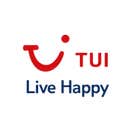
- Applying to Uni
- Apprenticeships
- Health & Relationships
- Money & Finance
Personal Statements
- Postgraduate
- U.S Universities
University Interviews
- Vocational Qualifications
- Accommodation
- Budgeting, Money & Finance
- Health & Relationships
- Jobs & Careers
- Socialising
Studying Abroad
- Studying & Revision
- Technology
- University & College Admissions
Guide to GCSE Results Day
Finding a job after school or college
Retaking GCSEs
In this section
Choosing GCSE Subjects
Post-GCSE Options
GCSE Work Experience
GCSE Revision Tips
Why take an Apprenticeship?
Applying for an Apprenticeship
Apprenticeships Interviews
Apprenticeship Wage
Engineering Apprenticeships
What is an Apprenticeship?
Choosing an Apprenticeship
Real Life Apprentices
Degree Apprenticeships
Higher Apprenticeships
A Level Results Day 2024
AS Levels 2024
Clearing Guide 2024
Applying to University
SQA Results Day Guide 2024
BTEC Results Day Guide
Vocational Qualifications Guide
Sixth Form or College
International Baccalaureate
Post 18 options
Finding a Job
Should I take a Gap Year?
Travel Planning
Volunteering
Gap Year Guide
Gap Year Blogs
Applying to Oxbridge
Applying to US Universities
Choosing a Degree
Choosing a University or College
Personal Statement Editing and Review Service
Guide to Freshers' Week
Student Guides
Student Cooking
Student Blogs
- Top Rated Personal Statements
Personal Statement Examples
Writing Your Personal Statement
- Postgraduate Personal Statements
- International Student Personal Statements
- Gap Year Personal Statements
Personal Statement Length Checker
Personal Statement Examples By University
Personal Statement Changes 2025
Personal Statement Template
Job Interviews
Types of Postgraduate Course
Writing a Postgraduate Personal Statement
Postgraduate Funding
Postgraduate Study
Internships
Choosing A College
Ivy League Universities
Common App Essay Examples
Universal College Application Guide
How To Write A College Admissions Essay
College Rankings
Admissions Tests
Fees & Funding
Scholarships
Budgeting For College
Online Degree
Platinum Express Editing and Review Service
Gold Editing and Review Service
Silver Express Editing and Review Service
UCAS Personal Statement Editing and Review Service
Oxbridge Personal Statement Editing and Review Service
Postgraduate Personal Statement Editing and Review Service
You are here
- Mature Student Personal Statements
- Personal Statements By University
- Personal Statement Editing Service
- Personal Statement Writing Guide
- Submit Your Personal Statement
- Personal Statement Questions 2025
- Personal Statement Changes 2024
Changes to the UCAS Personal Statement
The UCAS personal statement has been a stumbling block for university applicants for decades. However, UCAS (University and Colleges Admissions Service) is shortly to introduce an entirely new process which will instead adopt a structure incorporating six questions applicants will have to answer instead.
How will the personal statement be changing?
The previous requirement was for a lengthy and potentially unstructured personal statement which would be uploaded to the UCAS Hub.
Universities would read this statement, and potentially make admissions decisions and offers based upon your statement and your predicted grades. For a lot of students, especially those who didn’t necessarily have access – either socially or financially – to a lot of the extracurricular activities their peers might, this immediately put them at a disadvantage. Initially the new process was due to be introduced in 2024, for applicants looking for university entry from 2025. However, UCAS have now decided that it won't be introduced until 2025 at the earliest.
Currently, it is understood that the new process will ask you to answer questions on six areas related to your potential suitability for university entrance and study on your course. These are likely – but not yet confirmed – to be something along the following lines:
- Why do you want to study this course?
- What have you learned so far that prepares you for this course?
- What else have you done (that isn’t necessarily directly related to the subject) that helps you prepare, and why has this been useful?
- Are there any circumstances that the university needs to be aware of (such as personal, health, home, or other home life issues)?
- How have you prepared/are you preparing for student life (i.e. independent living)?
- Which styles of learning suit you best?
This structured statement will allow students to give the university admissions board a good idea of who they are and what they might offer to the course and to the institution, but also give them guided help with what has previously been a dreaded part of the admissions process. It’s not just students that are subject to changes here; teacher references will also undergo changes, with an emphasis on objective assessment. The changes are still in fledgling form, and feedback will be sought from end users to refine the changes even further if necessary.
When will the changes to the personal statement take effect?
If you’re applying next year for 2026 entry, the bad news is that you will still have to write a personal statement (although, of course, there’s nothing to stop you using the prototype questions to help you structure this and make the process easier!).
These changes will come into effect for students looking to enter a programme of higher education from 2026 onwards.
What will help you, however, if you’re planning to go to university in 2024, is the personalised tool .
This will allow you to see the kind of profiles that have been accepted onto courses similar to those you are interested in over the past five years. So really don’t despair if you’re in the “last of the personal statements” intake!
Why is the personal statement changing?
University entrants are changing. Applicants who wouldn’t have considered university education as being a possibility for them even a decade ago are now graduating with top degrees.
However, the personal statement – with a bias towards those who are lucky enough to have a rich social and extracurricular experience to back up their academic prowess – wasn’t adequately reflecting (or indeed supporting) the students who might have needs or circumstances that precluded wider experiences. Current findings from UCAS show that 79% of students found the personal statement “too difficult” to write without additional and appropriate support. That’s almost 4/5 of applicants, so unquestionably shows the need for change.
That doesn’t mean, however, that students don’t see and acknowledge the value of the personal statement. The revamped, structured statement should allow all university applicants to show their worth on an equal basis.
To find out more, read the following report on the Future of Undergraduate Admissions from UCAS.
- Share on twitter
- Share on facebook
Ucas to replace personal statement with series of questions
Admissions service also making changes to teacher references, and plans to release details of grade profiles that were accepted onto courses.
- Share on linkedin
- Share on mail

The Ucas personal statement is to be replaced by a series of questions following concerns that it was too stressful for UK students.
The admissions service said it believes the change to the 4,000 character essay – which had previously been criticised for contributing to inequalities in higher education access – will create “a more supportive framework”.
Advocates of reform said the change will help “level the playing field” in university admissions.
The Future of Undergraduate Admissions report by Ucas also announced that academic references would become structured questions, and that students will be able to see a range of accepted entry grades for different courses to improve transparency.
A recent Ucas survey found that 83 per cent of students reported the process of writing a personal statement stressful, with 79 per cent saying it is difficult to complete without support.
Based on this feedback, Kim Eccleston, head of strategy and reform at Ucas, says the current format will be reframed into a series of questions focusing on six key areas: motivation for the course, preparedness for the course, preparation through other experiences, extenuating circumstances, preparedness for study, and preferred learning style.
“We believe this will create a more supportive framework which in turn will help guide students through their responses by removing the guesswork, as well as capturing the information universities and colleges have told us they really need to know from applicants when it comes to offer-making”, she writes in a blog published by the Higher Education Policy Institute .
The questions are set to be introduced in 2024, for students entering higher education in 2025, while Ucas said it paved the way for further enhancements, such as moving to multimedia submissions.
Lee Elliot Major, professor of social mobility at the University of Exeter , said the move to structured questions was “hugely positive”.
“No one should underestimate how important this reform will be in helping to level the playing field in university admissions,” he added.
“I’ve been calling for reform as statements currently add further advantage for middle class applicants who are often given help in filling in their submissions.”
Providers had told Ucas that the subjective nature of the academic reference section – typically filled out by an applicant’s form tutor or careers adviser – made it challenging to be used to compare applicants against each other.
As a result, it will be replaced with three structured questions – a mandatory general statement about the referee’s school, plus optional information sections on extenuating circumstances affecting the applicant’s performance.
Beginning with the 2024 entry cycle, Professor Elliot Major said it will enable more “objective and useful comments from teachers”.
“As we enter an era of increasing competition for the most selective university degree courses, we need more structured and transparent university admissions that are fair and fit for purpose for all,” he added.
In addition, entry grade reports will be available through the Ucas website, which will give a range of grade profiles that have been accepted onto courses over a five-year period.
It said that this personalised tool, which will launch this year, will prompt applicants to dig deeper into entry requirements and re-evaluate options that may have been considered out of reach.
Register to continue
Why register?
- Registration is free and only takes a moment
- Once registered, you can read 3 articles a month
- Sign up for our newsletter
Or subscribe for unlimited access to:
- Unlimited access to news, views, insights & reviews
- Digital editions
- Digital access to THE’s university and college rankings analysis
Already registered or a current subscriber? Login
Related articles

Poor personal statement advice ‘harms university chances’
Sutton Trust study finds teachers’ perceptions of what makes a good Ucas application are very different to views of admissions tutors
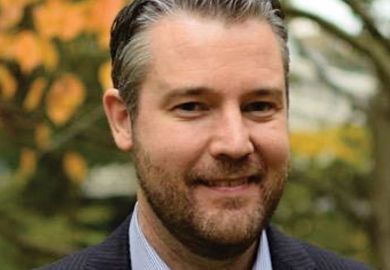
THE Live: publish historic entry grades to make admissions fairer, says Jarvis
Universities UK chief executive urges greater transparency in admissions
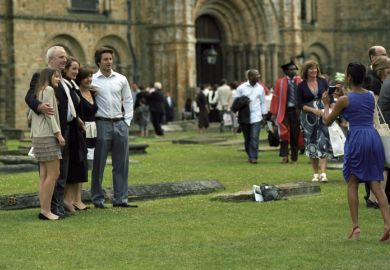
Queen’s to launch Canada’s first medical school admissions lottery
In a nation that struggles to get minority students into medicine, Ontario university eyes progress in broader admissions process

‘Local’ students just one in 10 at some elite universities
Durham again found to have lowest proportion of students from its own region, but highlights work to boost north east's low HE participation rate

Tibet’s easier gaokao offer for investors ‘exploitative’
Rights group criticises government’s move to use region’s lower university admissions standards to its advantage
Featured jobs
Ucas changes ‘fairer’ for disadvantaged students

Ucas will reframe the personal statement into a series of questions from next year, the Universities and Colleges Admissions Service has announced.
Questions are expected to focus on areas such as an applicant’s motivation for the course they are applying for, as well as their preferred approaches to learning.
Ucas intends to introduce the changes in 2024 for 2025 entry, after consulting with students, teachers, advisers, universities and colleges.
And a union leader has said that the move “feels to be a step towards a simplified, fairer application process”.
Six key areas have been identified for the focus of the questions so far: motivation for the course; preparedness for the course; preparation through other experiences; extenuating circumstances; preparedness for study; preferred learning style.
Over the past year, Ucas said it has “consulted with 1,200 domestic and international students, over 170 teachers and advisers and over 100 universities and colleges as well as engaging with governments, regulators and the charity sector across the UK”.
And it says it will continue to engage with the sector to help shape the delivery of the reforms “as we continue to test and validate our proposed questions”.
- University applications: Teachers ‘can’t fix systemic inequity’ in Ucas system
- Exclusive: Academies beat private schools in university applications
- Ucas applications: A month-by-month planner
Geoff Barton, general secretary of the Association of School and College Leaders, said that, currently, “it can feel as if personal statements favour more advantaged students whose parents have been through the university system, and are therefore better equipped to help their children write it and provide a wide range of experiences that they can cite within it”.
Mr Barton said that the existing system is “badly in need of reform” but warned that “changes will need to balance the need to establish a consistent format with allowing students to express themselves”.
“Breaking down the personal statement into specific questions feels to be a step towards a simplified, fairer application process,” he said. “We will consider the proposals in detail and consult with members before providing feedback.”
A 2022 Ucas survey found that 72 per cent of applicants felt positive about the personal statement, but 83 per cent reported that “the process of writing a personal statement is stressful”, with 79 per cent agreeing that the statement is “difficult to complete without support”.
Ucas has also announced today that it will bring in changes to the academic reference element of the application.
Under the changes, the free text approach will be replaced with three structured questions that will act as a “built-in guide for referees keeping their focus firmly in the areas that providers want to know more about”.
Lee Elliot Major, a professor of social mobility at the University of Exeter, said it was “hugely positive” to see Ucas confirming the move to structured questions.
He added: “No one should underestimate how important this reform will be in helping to level the playing field in university admissions. I’ve been calling for reform as statements currently add further advantage for middle-class applicants who are often given help in filling in their submissions.
“As we enter an era of increasing competition for the most selective university degree courses, we need more structured and transparent university admissions that are fair and fit for purpose for all.”
A report published last November by the Higher Education Policy Institute recommended that the personal statement be replaced with a series of short-response questions to address the “unnecessary burden” of the task , which was “contributing to inequalities in higher education access”.
You need a Tes subscription to read this article
Subscribe now to read this article and get other subscriber-only content:.
- Unlimited access to all Tes magazine content
- Exclusive subscriber-only stories
- Award-winning email newsletters
Already a subscriber? Log in
You need a subscription to read this article
Subscribe now to read this article and get other subscriber-only content, including:.
topics in this article


Great Medical School Personal Statement Examples (2024-2025) Insider’s Guide
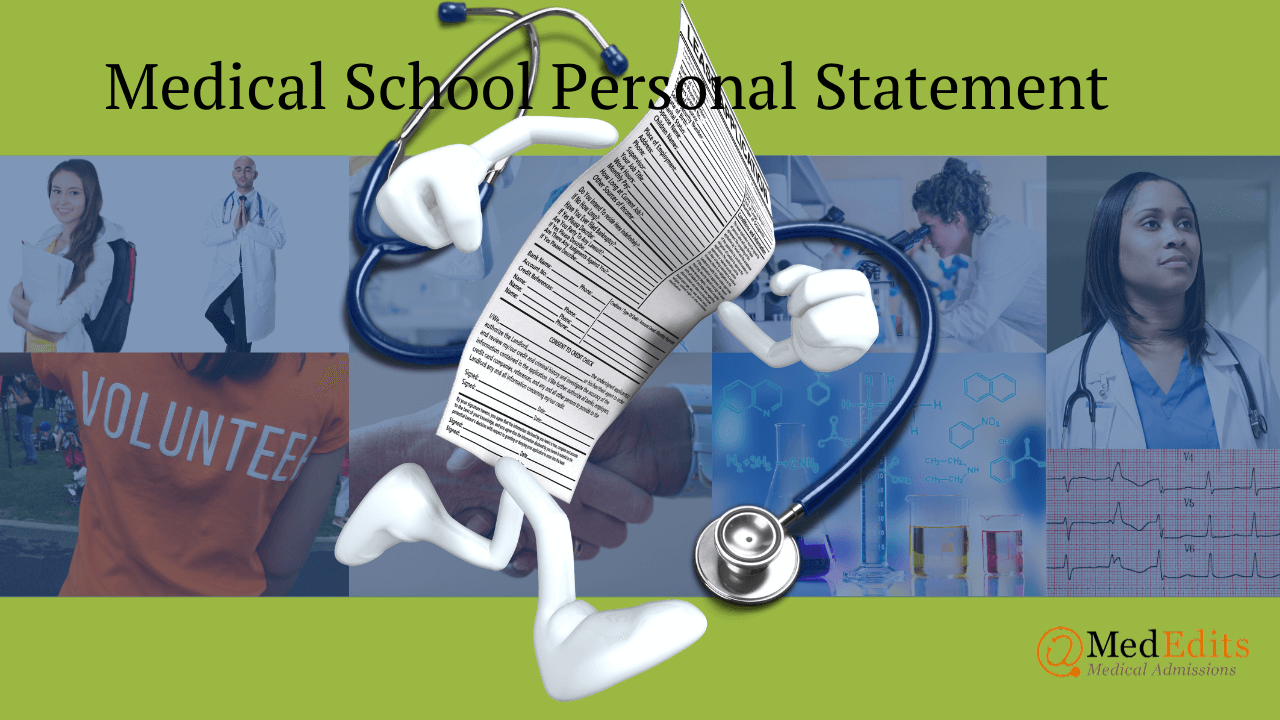
A physician and former medical school admissions officer teaches you how to write your medical school personal statement, step by step. Read several full-length medical school personal statement examples for inspiration.
In this article, a former medical school admissions officer explains exactly how to write a stand-out medical school personal statement!
Our goal is to empower you to write a medical school personal statement that reflects your individuality, truest aspirations and genuine motivations.
This guide also includes:
- Real life medical school personal statement examples
- Medical school personal statement inventory template and outline exercise
- AMCAS, TMDSAS, and AACOMAS personal statement prompts
- Advanced strategies to ensure you address everything admissions committees want to know
- The secret to writing a great medical school personal statement
So, if you want your medical school personal statement to earn more more medical school interviews, you will love this informative guide.
Let’s dive right in.
Table of Contents
Medical School Personal Statement Fundamentals
If you are getting ready to write your medical school personal statement for the 2024-2025 application year, you may already know that almost 60% of medical school applicants are not accepted every year . You have most likely also completed all of your medical school requirements and have scoured the internet for worthy medical school personal statement examples and guidance.
You know the medical school personal statement offers a crucial opportunity to show medical schools who you are beyond your GPA and MCAT score .
It provides an opportunity to express who you are as an individual, the major influences and background that have shaped your interests and values, what inspired you to pursue medicine, and what kind of a physician you envision yourself becoming.
However, with so much information online, you are not sure who to trust. We are happy you have found us!
Because the vast majority of people offering guidance are not former admissions officers or doctors , you must be careful when searching online.
We are real medical school admissions insiders and know what goes on behind closed doors and how to ensure your medical school personal statement has broad appeal while highlighting your most crucial accomplishments, perspectives, and insights.
With tight limits on space, it can be tough trying to decide what to include in your medical school personal statement to make sure you stand out. You must think strategically about how you want to present your personal “big picture” while showing you possess the preprofessional competencies med schools are seeking.
When a medical school admissions reviewer finishes reading your medical school personal statement, ask yourself:
- What are the most important things you want that person to remember about you?
- Does your medical school personal statement sum up your personality, interests, and talents?
- Does your medical school personal statement sound as if it’s written from the heart?
It’s pretty obvious to most admissions reviewers when applicants are trying too hard to impress them. Being authentic and upfront about who you are is the best way to be a memorable applicant.
The Biggest Medical School Personal Statement Mistakes
The most common medical school personal statement mistake we see students make is that they write about:
- What they have accomplished
- How they have accomplished it
By including details on what you have accomplished and how, you will make yourself sound like every other medical school applicant.
Most medical school applicants are involved in similar activities: research, clinical work, service, and social justice work.
To stand out, you must write from the heart making it clear you haven’t marched through your premedical years and checking boxes.
We also strongly discourage applicants from using ChatGPT or any AI bot to write their medical school personal statement. Writing in your own voice is essential and using anything automated will undermine success.
The Medical School Personal Statement Secret
MedEdits students stand out in the medical school personal statement because in their personal statements they address:
WHY they have accomplished what they have.
In other words, they write in more detail about their passions, interests, and what is genuinely important to them.
It sounds simple, we know, but by writing in a natural way, really zeroing in on WHY YOU DO WHAT YOU DO, you will appeal to a wide variety of people in a humanistic way.
MedEdits students have done extremely well in the most recent medical school admissions cycle. Many of these applicants have below average “stats” for the medical schools from which they are receiving interviews and acceptances.
Why? How is that possible? They all have a few things in common:
- They write a narrative that is authentic and distinctive to them.
- They write a medical school personal statement with broad appeal (many different types of people will be evaluating your application; most are not physicians).
- They don’t try too hard to impress; instead they write about the most impactful experiences they have had on their path to medical school.
- They demonstrate they are humble, intellectual, compassionate, and committed to a career in medicine all at the same time.
Keep reading for a step by step approach to write your medical school personal statement.
“After sitting on a medical school admissions committee for many years, I can tell you, think strategically about how you want to present your personal “big picture.” We want to know who you are as a human being.”
As physicians, former medical school faculty, and medical school admissions committee members, this article will offer a step by step guide to simplify the medical school personal statement brainstorming and writing process.
By following the proven strategies outlined in this article, you will be and to write a personal statement that will earn you more medical school interviews . This proven approach has helped hundreds of medical school applicants get in to medical school the first time they apply!
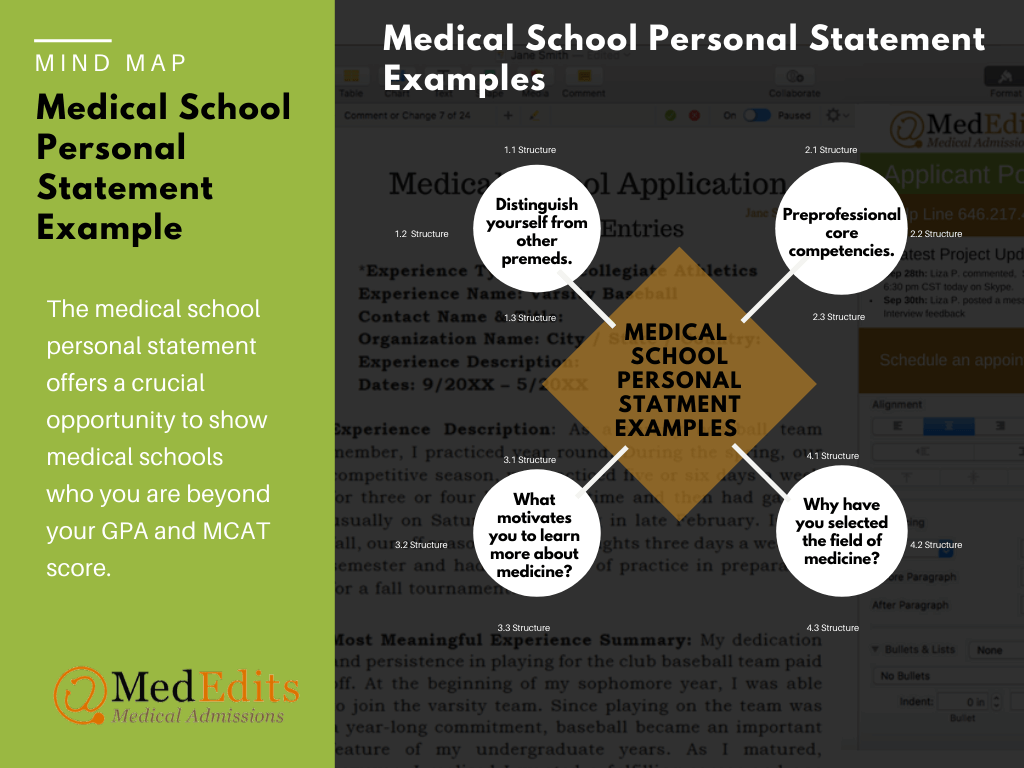
Learn the 2024-2025 Medical School Personal Statement Prompts ( AMCAS , TMDSAS , AACOMAS )
The personal statement is the major essay portion of your primary application process. In it, you should describe yourself and your background, as well as any important early exposures to medicine, how and why medicine first piqued your interest, what you have done as a pre med, your personal experiences, and how you became increasingly fascinated with it. It’s also key to explain why medicine is the right career for you, in terms of both personal and intellectual fulfillment, and to show your commitment has continued to deepen as you learned more about the field.
The personal statement also offers you the opportunity to express who you are outside of medicine. What are your other interests? Where did you grow up? What did you enjoy about college? Figuring out what aspects of your background to highlight is important since this is one of your only chances to express to the med school admissions committee before your interview what is important to you and why.
However, it is important to consider the actual personal statement prompt for each system through which you will apply, AMCAS, AACOMAS, and TMDSAS, since each is slightly different.
Getting into a medical school has never been more competitive. Let the experts at MedEdits help you with your medical school application materials. We’ve worked with more than 5,000 students and 94% have been admitted to medical school.
Need help with your Personal Statement?
Schedule a free 15 Minute Consultation with a MedEdits expert.
2024 AMCAS Personal Statement Prompt
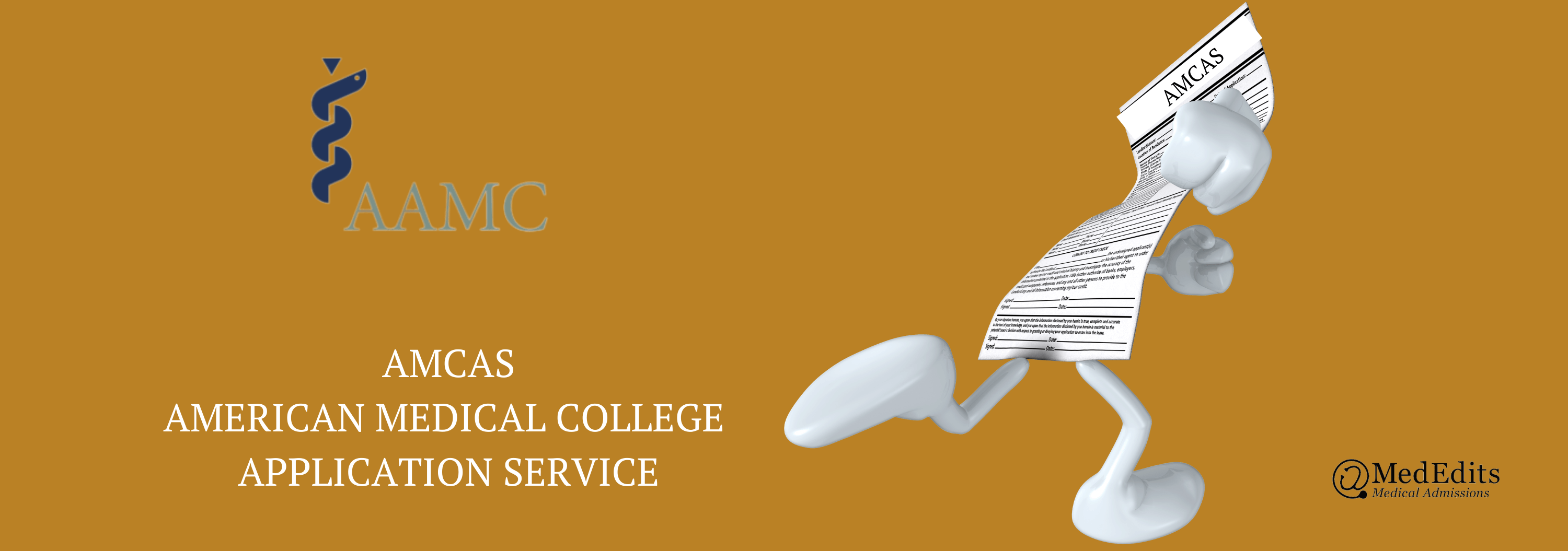
The AMCAS personal statement instructions are as follows:
Use the Personal Comments Essay as an opportunity to distinguish yourself from other applicants. Consider and write your Personal Comments Essay carefully; many admissions committees place significant weight on the essay. Here are some questions that you may want to consider while writing the essay:
- Why have you selected the field of medicine?
- What motivates you to learn more about medicine?
- What do you want medical schools to know about you that hasn’t been disclosed in other sections of the application?
In addition, you may wish to include information such as:
- Unique hardships, challenges, or obstacles that may have influenced your educational pursuits
- Comments on significant fluctuations in your academic record that are not explained elsewhere in your application
As you can see, these prompts are not vague; there are fundamental questions that admissions committees want you to answer when writing your personal statement. While the content of your statement should be focused on medicine, answering the open ended third question is a bit trickier.
The AMCAS personal statement length is 5,300 characters with spaces maximum.
2024 TMDSAS Personal Statement Prompt
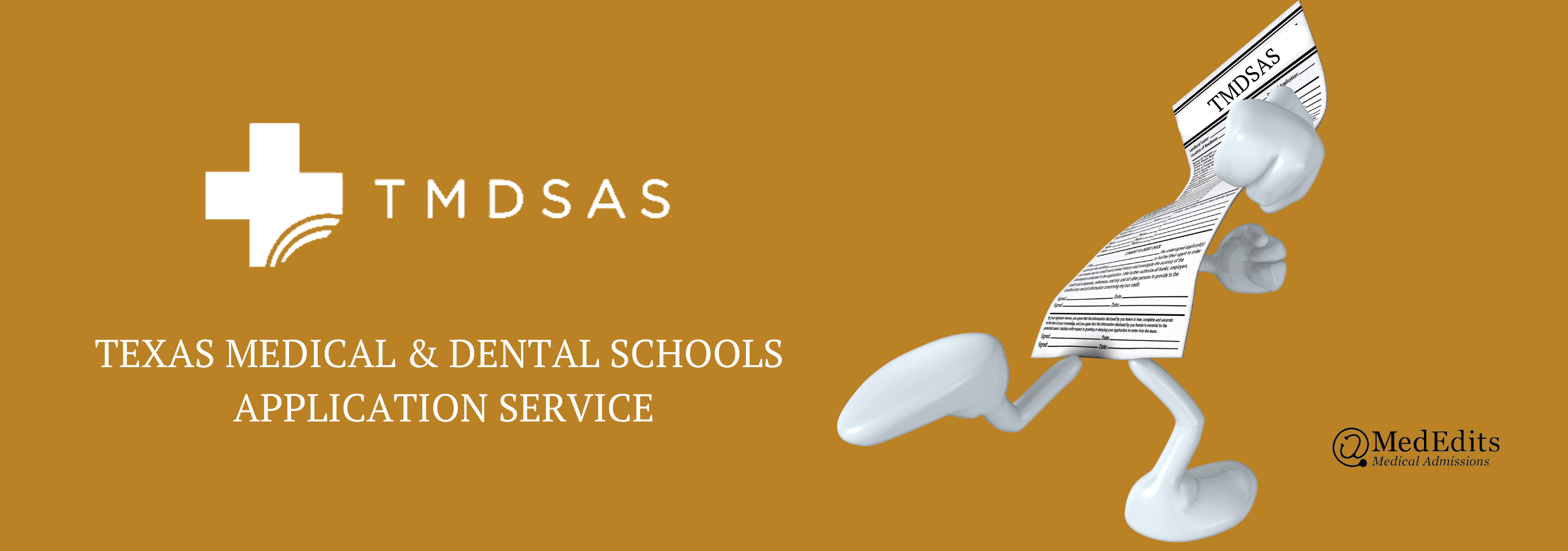
The TMDSAS personal statement is one of the most important pieces of your medical school application.
The TMDSAS personal statement prompt is as follows:
Explain your motivation to seek a career in medicine. Be sure to include the value of your experiences that prepare you to be a physician.
This TMDSAS prompt is very similar to the AMCAS personal statement prompt. The TMDSAS personal statement length is 5,000 characters with spaces whereas the AMCAS personal statement length is 5,300 characters with spaces. Most students use the same essay (with very minor modifications, if necessary) for both application systems.
You’ve been working hard on your med school application, reading medical school personal statement examples, editing, revising, editing and revising. Make sure you know where you’re sending your personal statement and application. Watch this important medical school admissions statistics video.
2024 AACOMAS Personal Statement Prompt
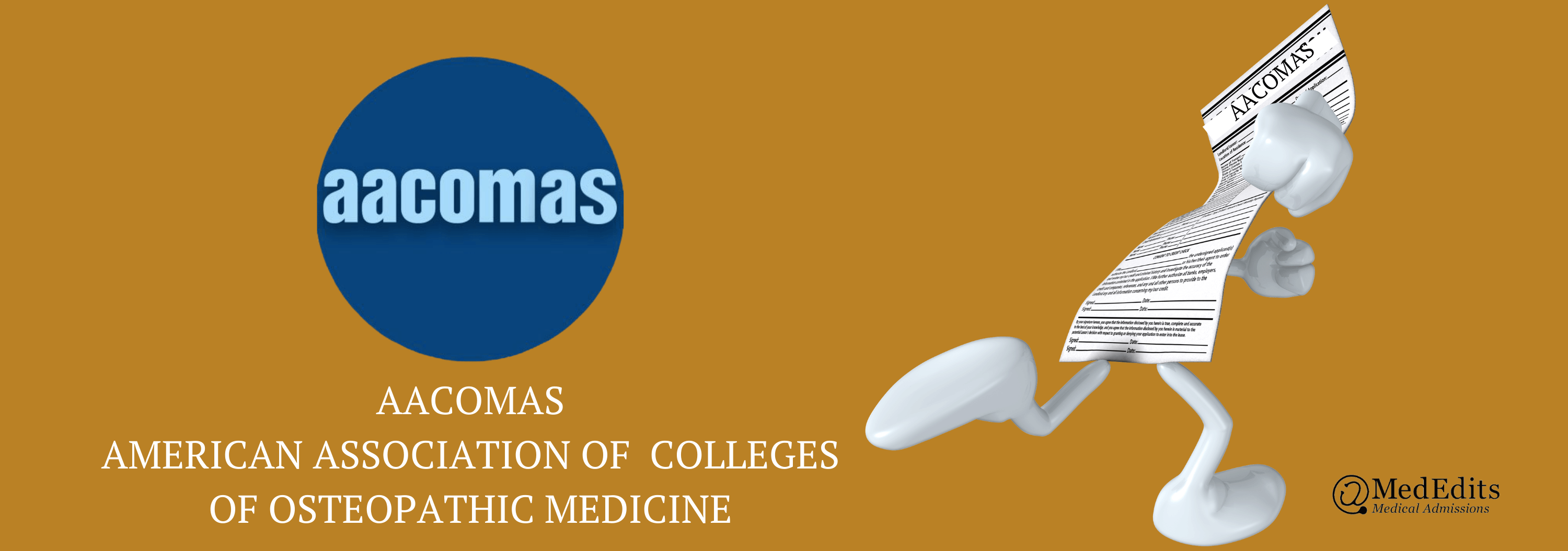
The AACOMAS personal statement is for osteopathic medical schools specifically. As with the AMCAS statement, you need to lay out your journey to medicine as chronologically as possible in 5,300 characters with spaces or less. So you essentially have the same story map as for an AMCAS statement. Most important, you must show you are interested in osteopathy specifically. Therefore, when trying to decide what to include or leave out, prioritize any osteopathy experiences you have had, or those that are in line with the osteopathic philosophy of the mind-body connection, the body as self-healing, and other tenets.
Medical School Application Timeline and When to Write your Personal Statement
If you’re applying to both allopathic and osteopathic schools, you can most likely use the same medical school personal statement for both AMCAS and AACOMAS. In fact, this is why AACOMAS changed the personal statement length to match the AMCAS length several years ago.
Most medical school personal statements can be used for AMCAS and AACOMAS.
Know the Required Medical School Personal Statement Length
Below are the medical schools personal statement length limits for each application system. As you can see, they are all very similar. When you start brainstorming and writing your personal statement, keep these limits in mind.
AMCAS Personal Statement Length : 5,300 characters with spaces.
As per the AAMC website : “The available space for this essay is 5,300 characters (spaces are counted as characters), or approximately one page. You will receive an error message if you exceed the available space.”
AACOMAS Personal Statement Length : 5,300 characters with spaces
TMDSAS Personal Statement Length : 5,000 characters with spaces
As per the TMDSAS Website (Page 36): “The personal essay asks you to explain your motivation to seek a career in medicine. You are asked to include the value of your experiences that prepare you to be a physician. The essay is limited to 5000 characters, including spaces.”
Demonstrate Required Preprofessional Competencies
Next, your want to be aware of the nine preprofessional core competencies as outlined by the Association of American Medical Colleges . Medical school admissions committees want to see, as evidenced by your medical school personal statement and application, that you possess these qualities and characteristics. Now, don’t worry, medical school admissions committees don’t expect you to demonstrate all of them, but, you should demonstrate some.
- Service Orientation
- Social Skills
- Cultural Competence
- Oral Communication
- Ethical Responsibility to Self and Others
- Reliability and Dependability
- Resilience and Adaptability
- Capacity for Improvement
In your personal statement, you might be able to also demonstrate the four thinking and reasoning competencies:
- Critical Thinking
- Quantitative Reasoning
- Written Communication
- Scientific Inquiry
So, let’s think about how to address the personal statement prompts in a slightly different way while ensuring you demonstrate the preprofessional competencies. When writing your personal statement, be sure it answers the four questions that follow and you will “hit” most of the core competencies listed above.
1. What have you done that supports your interest in becoming a doctor?
I always advise applicants to practice “evidence based admissions.” The reader of your essay wants to see the “evidence” that you have done what is necessary to understand the practice of medicine. This includes clinical exposure, research, and community service, among other activities.
2. Why do you want to be a doctor?
This may seem pretty basic – and it is – but admissions officers need to know WHY you want to practice medicine. Many applicants make the mistake of simply listing what they have done without offering insights about those experiences that answer the question, “Why medicine?” Your reasons for wanting to be a doctor may overlap with those of other applicants. This is okay because the experiences in which you participated, the stories you can tell about those experiences, and the wisdom you gained are completely distinct—because they are only yours.
“In admissions committee meetings we were always interested in WHY you wanted to earn a medical degree and how you would contribute to the medical school community.”
Medical school admissions committees want to know that you have explored your interest deeply and that you can reflect on the significance of these clinical experiences and volunteer work. But writing only that you “want to help people” does not support a sincere desire to become a physician; you must indicate why the medical profession in particular—rather than social work, teaching, or another “helping” profession—is your goal.
3. How have your experiences influenced you?
It is important to show how your experiences are linked and how they have influenced you. How did your experiences motivate you? How did they affect what else you did in your life? How did your experiences shape your future goals? Medical school admissions committees like to see a sensible progression of involvements. While not every activity needs to be logically “connected” with another, the evolution of your interests and how your experiences have nurtured your future goals and ambitions show that you are motivated and committed.
4. Who are you as a person? What are your values and ideals?
Medical school admissions committees want to know about you as an individual beyond your interests in medicine, too. This is where answering that third open ended question in the prompt becomes so important. What was interesting about your background, youth, and home life? What did you enjoy most about college? Do you have any distinctive passions or interests? They want to be convinced that you are a good person beyond your experiences. Write about those topics that are unlikely to appear elsewhere in your statement that will offer depth and interest to your work and illustrate the qualities and characteristics you possess.
Related Articles:
- How to Get into Stanford Medical School
- How to Get into NYU Medical School
- How To Get Into Columbia Medical School
- How To Get Into UT Southwestern Medical School
- How To Get Into Harvard Medical School
Complete Your Personal Inventory and Outline (Example Below)
The bulk of your essay should be about your most valuable experiences, personal, academic, scholarly, clinical, academic and extracurricular activities that have impacted your path to medical school and through which you have learned about the practice of medicine. The best personal statements cover several topics and are not narrow in scope. Why is this important? Many different people with a variety of backgrounds, interests, and ideas of what makes a great medical student will be reading your essay. You want to make sure you essay has broad appeal.
The following exercise will help you to determine what experiences you should highlight in your personal statement.
When composing your personal statement, keep in mind that you are writing, in effect, a “story” of how you arrived at this point in your life. But, unlike a “story” in the creative sense, yours must also offer convincing evidence for your decision to apply to medical school. Before starting your personal statement, create an experience- based personal inventory:
- Write down a list of the most important experiences in your life and your development. The list should be all inclusive and comprise those experiences that had the most impact on you. Put the list, which should consist of personal, extracurricular, and academic events, in chronological order.
- From this list, determine which experiences you consider the most important in helping you decide to pursue a career in medicine. This “experience oriented” approach will allow you to determine which experiences best illustrate the personal competencies admissions committees look for in your written documents. Remember that you must provide evidence for your interest in medicine and for most of the personal qualities and characteristics that medical school admissions committees want to see.
- After making your list, think about why each “most important” experience was influential and write that down. What did you observe? What did you learn? What insights did you gain? How did the experience influence your path and choices?
- Then think of a story or illustration for why each experience was important.
- After doing this exercise, evaluate each experience for its significance and influence and for its “story” value. Choose to write about those experiences that not only were influential but that also will provide interesting reading, keeping in mind that your goal is to weave the pertinent experiences together into a compelling story. In making your choices, think about how you will link each experience and transition from one topic to the next.
- Decide which of your listed experiences you will use for your introduction first (see below for more about your introduction). Then decide which experiences you will include in the body of your personal statement, create a general outline, and get writing!
Remember, you will also have your work and activities entries and your secondary applications to write in more detail about your experiences. Therefore, don’t feel you must pack everything in to your statement!
Craft a Compelling Personal Statement Introduction and Body
You hear conflicting advice about application essays. Some tell you not to open with a story. Others tell you to always begin with a story. Regardless of the advice you receive, be sure to do three things:
- Be true to yourself. Everyone will have an opinion regarding what you should and should not write. Follow your own instincts. Your personal statement should be a reflection of you, and only you.
- Start your personal statement with something catchy. Think about the list of potential topics above.
- Don’t rush your work. Composing thoughtful documents takes time and you don’t want your writing and ideas to be sloppy and underdeveloped.
Most important is to begin with something that engages your reader. A narrative, a “story,” an anecdote written in the first or third person, is ideal. Whatever your approach, your first paragraph must grab your reader’s attention and motivate him to want to continue reading. I encourage applicants to start their personal statement by describing an experience that was especially influential in setting them on their path to medical school. This can be a personal or scholarly experience or an extracurricular one. Remember to avoid clichés and quotes and to be honest and authentic in your writing. Don’t try to be someone who you are not by trying to imitate personal statement examples you have read online or “tell them what you think they want to hear”; consistency is key and your interviewer is going to make sure that you are who you say you are!
When deciding what experiences to include in the body of your personal statement, go back to your personal inventory and identify those experiences that have been the most influential in your personal path and your path to medical school. Keep in mind that the reader wants to have an idea of who you are as a human being so don’t write your personal statement as a glorified resume. Include some information about your background and personal experiences that can give a picture of who you are as a person outside of the classroom or laboratory.
Ideally, you should choose two or three experiences to highlight in the body of your personal statement. You don’t want to write about all of your accomplishments; that is what your application entries are for!
Write Your Personal Statement Conclusion
In your conclusion, it is customary to “go full circle” by coming back to the topic—or anecdote—you introduced in the introduction, but this is not a must. Summarize why you want to be a doctor and address what you hope to achieve and your goals for medical school. Write a conclusion that is compelling and will leave the reader wanting to meet you.
Complete Personal Statement Checklist
When reading your medical school personal statement be sure it:
Shows insight and introspection
The best medical school personal statements tell a great deal about what you have learned through your experiences and the insights you have gained.
You want to tell your story by highlighting those experiences that have been the most influential on your path to medical school and to give a clear sense of chronology. You want your statement always to be logical and never to confuse your reader.
Is interesting and engaging
The best personal statements engage the reader. This doesn’t mean you must use big words or be a literary prize winner. Write in your own language and voice, but really think about your journey to medical school and the most intriguing experiences you have had.
Gives the reader a mental image of who you are
You want the reader to be able to envision you as a caregiver and a medical professional. You want to convey that you would be a compassionate provider at the bedside – someone who could cope well with crisis and adversity.
Illustrates your passion for, and commitment to, medicine
Your reader must be convinced that you are excited about and committed to a career in medicine!
Above all, your personal statement should be about you. Explain to your reader what you have done and why you want to be a doctor with insight, compassion, and understanding.
Medical School Personal Statement Myths
Also keep in mind some common myths about personal statements that I hear quite often:
My personal statement must have a theme.
Not true. The vast majority of personal statements do not have themes. In fact, most are somewhat autobiographical and are just as interesting as those statements that are woven around a “theme.” It is only the very talented writer who can creatively write a personal statement around a theme, and this approach often backfires since the applicant fails to answer the three questions above.
My personal statement must be no longer than one page.
Not true. This advice is antiquated and dates back to the days of the written application when admissions committees flipped through pages. If your personal statement is interesting and compelling, it is fine to use the entire allotted space. The application systems have incorporated limits for exactly this reason! Many students, depending on their unique circumstances, can actually undermine their success by limiting their personal statement to a page. That said, never max out a space just for the sake of doing so. Quality writing and perspectives are preferable to quantity.
My personal statement should not describe patient encounters or my personal medical experiences.
Not true. Again, the actual topics on which you focus in your personal statement are less important than the understanding you gained from those experiences. I have successful clients who have written extremely powerful and compelling personal statements that included information about clinical encounters – both personal and professional. Write about whichever experiences were the most important on your path to medicine. It’s always best, however, to avoid spending too much space on childhood and high school activities. Focus instead on those that are more current.
In my personal statement I need to sell myself.
Not exactly true. You never want to boast in your personal statement. Let your experiences, insights, and observations speak for themselves. You want your reader to draw the conclusion – on his or her own – that you have the qualities and characteristics the medical school seeks. Never tell what qualities and characteristics you possess; let readers draw these conclusions on their own based on what you write.
Medical School Personal Statement Examples and Analysis for Inspiration
Below are examples of actual medical school personal statements. You can also likely find medical school personal statements on Reddit.
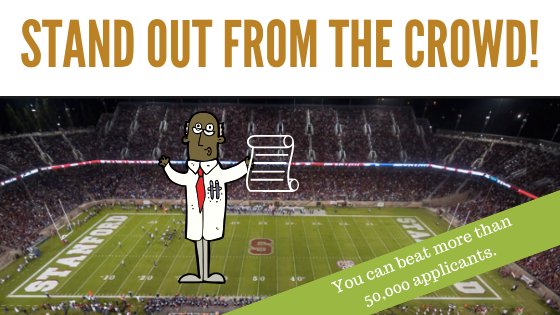
AMCAS Medical School Personal Statement Example and Analysis #1 with Personal Inventory
We will use Amy to illustrate the general process of writing an application to medical school, along with providing the resulting documents. Amy will first list those experiences, personal, extracurricular, and scholarly, that have been most influential in two areas: her life in general and her path to medical school. She will put this personal inventory in chronologic order for use in composing her personal statement.
She will then select those experiences that were the most significant to her and will reflect and think about why they were important. For her application entries, Amy will write about each experience, including those that she considers influential in her life but not in her choice of medicine, in her application entries. Experiences that Amy will not write about in her activity entries or her personal statement are those that she does not consider most influential in either her life or in her choice of medicine.
Amy’s personal inventory (from oldest to most recent)
- Going with my mom to work. She is a surgeon — I was very curious about what she did. I was intrigued by the relationships she had with patients and how much they valued her efforts. I also loved seeing her as “a doctor” since, to me, she was just “mom.”
- I loved biology in high school. I started to think seriously about medicine then. It was during high school that I became fascinated with biology and how the human body worked. I would say that was when I thought, “Hmm, maybe I should be a doctor.”
- Grandmother’s death, senior year of high school. My grandmother’s death was tragic. It was the first time I had ever seen someone close to me suffer. It was one of the most devastating experiences in my life.
- Global Health Trip to Guatemala my freshman year of college. I realized after going to Guatemala that I had always taken my access to health care for granted. Here I saw children who didn’t have basic health care. This made me want to become a physician so I could give more to people like those I met in Guatemala.
- Sorority involvement. Even though sorority life might seem trivial, I loved it. I learned to work with different types of people and gained some really valuable leadership experience.
- Poor grades in college science classes. I still regret that I did badly in my science classes. I think I was immature and was also too involved in other activities and didn’t have the focus I needed to do well. I had a 3.4 undergraduate GPA.
- Teaching and tutoring Jose, a child from Honduras. In a way, meeting Jose in a college tutoring program brought my Guatemala experience to my home. Jose struggled academically, and his parents were immigrants and spoke only Spanish, so they had their own challenges. I tried to help Jose as much as I could. I saw that because he lacked resources, he was at a tremendous disadvantage.
- Volunteering at Excellent Medical Center. Shadowing physicians at the medical center gave me a really broad view of medicine. I learned about different specialties, met many different patients, and saw both great and not-so-great physician role models. Counselor at Ronald McDonald House. Working with sick kids made me appreciate my health. I tried to make them happy and was so impressed with their resilience. It made me realize that good health is everything.
- Oncology research. Understanding what happens behind the scenes in research was fascinating. Not only did I gain some valuable research experience, but I learned how research is done.
- Peer health counselor. Communicating with my peers about really important medical tests gave me an idea of the tremendous responsibility that doctors have. I also learned that it is important to be sensitive, to listen, and to be open-minded when working with others.
- Clinical Summer Program. This gave me an entirely new view of medicine. I worked with the forensics department, and visiting scenes of deaths was entirely new to me. This experience added a completely new dimension to my understanding of medicine and how illness and death affect loved ones.
- Emergency department internship. Here I learned so much about how things worked in the hospital. I realized how important it was that people who worked in the clinical department were involved in creating hospital policies. This made me understand, in practical terms, how an MPH would give me the foundation to make even more change in the future.
- Master’s in public health. I decided to get an MPH for two reasons. First of all, I knew my undergraduate science GPA was an issue so I figured that graduate level courses in which I performed well would boost my record. I don’t think I will write this on my application, but I also thought the degree would give me other skills if I didn’t get into medical school, and I knew it would also give me something on which I could build during medical school and in my career since I was interested in policy work.
As you can see from Amy’s personal inventory list, she has many accomplishments that are important to her and influenced her path. The most influential personal experience that motivated her to practice medicine was her mother’s career as a practicing physician, but Amy was also motivated by watching her mother’s career evolve. Even though the death of her grandmother was devastating for Amy, she did not consider this experience especially influential in her choice to attend medical school so she didn’t write about it in her personal statement.
Amy wrote an experience-based personal statement, rich with anecdotes and detailed descriptions, to illustrate the evolution of her interest in medicine and how this motivated her to also earn a master’s in public health.
Amy’s Medical School Personal Statement Example:
She was sprawled across the floor of her apartment. Scattered trash, decaying food, alcohol bottles, medication vials, and cigarette butts covered the floor. I had just graduated from college, and this was my first day on rotation with the forensic pathology department as a Summer Scholar, one of my most valuable activities on the path to medical school. As the coroner deputy scanned the scene for clues to what caused this woman’s death, I saw her distraught husband. I did not know what to say other than “I am so sorry.” I listened intently as he repeated the same stories about his wife and his dismay that he never got to say goodbye. The next day, alongside the coroner as he performed the autopsy, I could not stop thinking about the grieving man.
Discerning a cause of death was not something I had previously associated with the practice of medicine. As a child, I often spent Saturday mornings with my mother, a surgeon, as she rounded on patients. I witnessed the results of her actions, as she provided her patients a renewed chance at life. I grew to honor and respect my mother’s profession. Witnessing the immense gratitude of her patients and their families, I quickly came to admire the impact she was able to make in the lives of her patients and their loved ones.
I knew I wanted to pursue a career in medicine as my mother had, and throughout high school and college I sought out clinical, research, and volunteer opportunities to gain a deeper understanding of medicine. After volunteering with cancer survivors at Camp Ronald McDonald, I was inspired to further understand this disease. Through my oncology research, I learned about therapeutic processes for treatment development. Further, following my experience administering HIV tests, I completed research on point-of-care HIV testing, to be instituted throughout 26 hospitals and clinics. I realized that research often served as a basis for change in policy and medical practice and sought out opportunities to learn more about both.
All of my medically related experiences demonstrated that people who were ‘behind the scenes’ and had limited or no clinical background made many of the decisions in health care. Witnessing the evolution of my mother’s career further underscored the impact of policy change on the practice of medicine. In particular, the limits legislation imposed on the care she could provide influenced my perspective and future goals. Patients whom my mother had successfully treated for more than a decade, and with whom she had long-standing, trusting relationships, were no longer able to see her, because of policy coverage changes. Some patients, frustrated by these limitations, simply stopped seeking the care they needed. As a senior in college, I wanted to understand how policy transformations came about and gain the tools I would need to help effect administrative and policy changes in the future as a physician. It was with this goal in mind that I decided to complete a master’s in public health program before applying to medical school.
As an MPH candidate, I am gaining insight into the theories and practices behind the complex interconnections of the healthcare system; I am learning about economics, operations, management, ethics, policy, finance, and technology and how these entities converge to impact delivery of care. A holistic understanding of this diverse, highly competitive, market-driven system will allow me, as a clinician, to find solutions to policy, public health, and administration issues. I believe that change can be more effective if those who actually practice medicine also decide where improvements need to be made.
For example, as the sole intern for the emergency department at County Medical Center, I worked to increase efficiency in the ED by evaluating and mapping patient flow. I tracked patients from point of entry to point of discharge and found that the discharge process took up nearly 35% of patients’ time. By analyzing the reasons for this situation, in collaboration with nurses and physicians who worked in the ED and had an intimate understanding of what took place in the clinical area, I was able to make practical recommendations to decrease throughput time. The medical center has already implemented these suggestions, resulting in decreased length of stays. This example illustrates the benefit of having clinicians who work ‘behind the scenes’ establish policies and procedures, impacting operational change and improving patient care. I will also apply what I have learned through this project as the business development intern at Another Local Medical Center this summer, where I will assist in strategic planning, financial analysis, and program reviews for various clinical departments.
Through my mother’s career and my own medical experiences, I have become aware of the need for clinician administrators and policymakers. My primary goal as a physician will be to care for patients, but with the knowledge and experience I have gained through my MPH, I also hope to effect positive public policy and administrative changes.
What’s Good About Amy’s Medical School Personal Statement:
Paragraphs 1 and 2: Amy started her personal statement by illustrating a powerful experience she had when she realized that medical caregivers often feel impotent, and how this contrasted with her understanding of medicine as a little girl going with her mother to work. Recognition of this intense contrast also highlights Amy’s maturity.
Paragraph 3: Amy then “lists” a few experiences that were important to her.
Paragraph 4: Amy describes the commonality in some of her experiences and how her observations were substantiated by watching the evolution of her mother’s practice. She then explains how this motivated her to earn an MPH so she could create change more effectively as a physician than as a layman.
Paragraph 5: Amy then explains how her graduate degree is helping her to better understand the “issues in medicine” that she observed.
Paragraph 6: Amy then describes one exceptional accomplishment she had that highlights what she has learned and how she has applied it.
Paragraph 7: Finally, Amy effectively concludes her personal statement and summarizes the major topics addressed in her essay.
As you can see, Amy’s statement has excellent flow, is captivating and unusual, and illustrates her understanding of, and commitment to, medicine. She also exhibits, throughout her application entries and statement, the personal competencies, characteristics, and qualities that medical school admissions officers are seeking. Her application also has broad appeal; reviewers who are focused on research, cultural awareness, working with the underserved, health administration and policy, teaching, or clinical medicine would all find it of interest.

med school personal statement examples
Osteopathic Medical School Personal Statement Example and Analysis #2
Medical School Personal Statement Example Background: This is a nontraditional applicant who applied to osteopathic medical schools. With a 500 and a 504 on the MCAT , he needed to showcase how his former career and what he learned through his work made him an asset. He also needed to convey why osteopathic medicine was an ideal fit for him. The student does an excellent job illustrating his commitment to medicine and explaining why and how he made the well-informed decision to leave his former career to pursue a career in osteopathic medicine.
What’s Good About It: A nontraditional student with a former career, this applicant does a great job outlining how and why he decided to pursue a career in medicine. Clearly dedicated to service, he also does a great job making it clear he is a good fit for osteopathic medical school and understands this distinctions of osteopathic practice..
Working as a police officer, one comes to expect the unexpected, but sometimes, when the unexpected happens, one can’t help but be surprised. In November 20XX, I had been a police officer for two years when my partner and I happened to be nearby when a man had a cardiac emergency in Einstein Bagels. Entering the restaurant, I was caught off guard by the lifeless figure on the floor, surrounded by spilled food. Time paused as my partner and I began performing CPR, and my heart raced as I watched color return to the man’s pale face.
Luckily, paramedics arrived within minutes to transport him to a local hospital. Later, I watched as the family thanked the doctors who gave their loved one a renewed chance at life. That day, in the “unexpected,” I confirmed that I wanted to become a physician, something that had attracted me since childhood.
I have always been enthralled by the science of medicine and eager to help those in need but, due to life events, my path to achieving this dream has been long. My journey began following high school when I joined the U.S. Army. I was immature and needed structure, and I knew the military was an opportunity to pursue my medical ambitions. I trained as a combat medic and requested work in an emergency room of an army hospital. At the hospital, I started IVs, ran EKGs, collected vital signs, and assisted with codes. I loved every minute as I was directly involved in patient care and observed physicians methodically investigating their patients’ signs and symptoms until they reached a diagnosis. Even when dealing with difficult patients, the physicians I worked with maintained composure, showing patience and understanding while educating patients about their diseases. I observed physicians not only as clinicians but also as teachers. As a medic, I learned that I loved working with patients and being part of the healthcare team, and I gained an understanding of acute care and hospital operations.
Following my discharge in 20XX, I transferred to an army reserve hospital and continued as a combat medic until 20XX. Working as a medic at several hospitals and clinics in the area, I was exposed to osteopathic medicine and the whole body approach to patient care. I was influenced by the D.O.s’ hands-on treatment and their use of manipulative medicine as a form of therapy. I learned that the body cannot function properly if there is dysfunction in the musculoskeletal system.
In 20XX, I became a police officer to support myself as I finished my undergraduate degree and premed courses. While working the streets, I continued my patient care experiences by being the first to care for victims of gunshot wounds, stab wounds, car accidents, and other medical emergencies. In addition, I investigated many unknown causes of death with the medical examiner’s office. I often found signs of drug and alcohol abuse and learned the dangers and power of addiction. In 20XX, I finished my undergraduate degree in education and in 20XX, I completed my premed courses.
Wanting to learn more about primary care medicine, in 20XX I volunteered at a community health clinic that treats underserved populations. Shadowing a family physician, I learned about the physical exam as I looked into ears and listened to the hearts and lungs of patients with her guidance. I paid close attention as she expressed the need for more PCPs and the important roles they play in preventing disease and reducing ER visits by treating and educating patients early in the disease process. This was evident as numerous patients were treated for high cholesterol, elevated blood pressure, and diabetes, all conditions that can be resolved or improved by lifestyle changes. I learned that these changes are not always easy for many in underserved populations as healthier food is often more expensive and sometimes money for prescriptions is not available. This experience opened my eyes to the challenges of being a physician in an underserved area.
The idea of disease prevention stayed with me as I thought about the man who needed CPR. Could early detection and education about heart disease have prevented his “unexpected” cardiac event? My experiences in health care and law enforcement have confirmed my desire to be an osteopathic physician and to treat the patients of the local area. I want to eliminate as many medical surprises as I can.

Texas Medical School Personal Statement Example and Analysis #3
Medical School Personal Statement Example Background: This applicant, who grew up with modest means, should be an inspiration to us all. Rather than allowing limited resources to stand in his way, he took advantage of everything that was available to him. He commuted to college from home and had a part-time job so he was stretched thin, and his initial college performance suffered. However, he worked hard and his grades improved. Most medical school admissions committees seek out applicants like this because, by overcoming adversity and succeeding with limited resources, they demonstrate exceptional perseverance, maturity, and dedication. His accomplishments are, by themselves, impressive and he does an outstanding job of detailing his path, challenges, and commitment to medicine. He received multiple acceptances to top medical schools and was offered scholarships.
What’s Good About It: This student does a great job opening his personal statement with a beautifully written introduction that immediately takes the reader to Central America. He then explains his path, why he did poorly early in college, and goes on to discuss his academic interests and pursuits. He is also clearly invested in research and articulates that he is intellectually curious, motivated, hard working, compassionate and committed to a career in medicine by explaining his experiences using interesting language and details. This is an intriguing statement that makes clear the applicant is worthy of an interview invitation. Finally, the student expresses his interest in attending medical school in Texas.
They were learning the basics of carpentry and agriculture. The air was muggy and hot, but these young boys seemed unaffected, though I and my fellow college students sweated and often complained. As time passed, I started to have a greater appreciation for the challenges these boys faced. These orphans, whom I met and trained in rural Central America as a member of The Project, had little. They dreamed of using these basic skills to earn a living wage. Abandoned by their families, they knew this was their only opportunity to re-enter society as self- sufficient individuals. I stood by them in the fields and tutored them after class. And while I tried my best to instill in them a strong work ethic, it was the boys who instilled in me a desire to help those in need. They gave me a new perspective on my decision to become a doctor.
I don’t know exactly when I decided to become a physician; I have had this goal for a long time. I grew up in the inner city of A City, in Texas and attended magnet schools. My family knew little about higher education, and I learned to seek out my own opportunities and advice. I attended The University with the goal of gaining admission to medical school. When I started college, I lacked the maturity to focus on academics and performed poorly. Then I traveled to Central America. Since I was one of the few students who spoke Spanish, many of the boys felt comfortable talking with me. They saw me as a role model.
The boys worked hard so that they could learn trades that would help them to be productive members of society. It was then I realized that my grandparents, who immigrated to the US so I would have access to greater opportunities, had done the same. I felt like I was wasting what they had sacrificed for me. When I returned to University in the fall, I made academics my priority and committed myself to learn more about medicine .
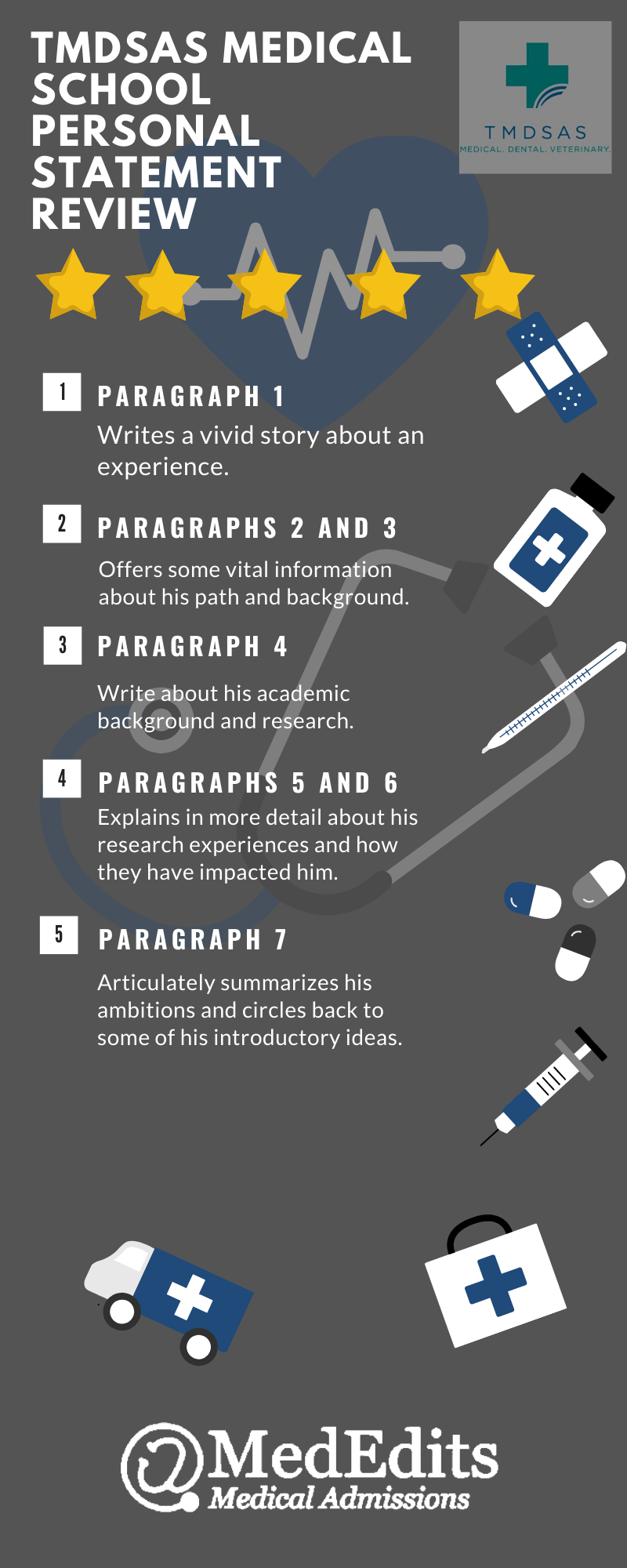
Through my major in neuroscience, I strengthened my understanding of how we perceive and experience life. In systems neurobiology, I learned the physiology of the nervous system. Teaching everything from basic neural circuits to complex sensory pathways, Professor X provided me with the knowledge necessary to conduct research in Parkinson’s disease. My research focused on the ability of antioxidants to prevent the onset of Parkinson’s, and while my project was only a pilot study at the time, Professor X encouraged me to present it at the National Research Conference. During my senior year, I developed the study into a formal research project, recruiting the help of professors of statistics and biochemistry.
Working at the School of Medicine reinforced my analytical skills. I spent my summer in the department of emergency medicine, working with the department chair, Dr. Excellent. Through Dr. Excellent’s mentorship, I participated in a retrospective study analyzing patient charts to determine the efficacy of D-dimer assays in predicting blood clots. The direct clinical relevance of my research strengthened my commitment and motivated my decision to seek out more clinical research opportunities.
A growing awareness of the role of human compassion in healing has also influenced my choice to pursue a career in medicine. It is something no animal model or cell culture can ever duplicate or rival. Working in clinical research has allowed me to see the selflessness of many physicians and patients and their mutual desire to help others. As a research study assistant in the department of surgery, I educate and enroll patients in clinical trials. One such study examines the role of pre-operative substance administration in tumor progression. Patients enrolled in this study underwent six weeks of therapy before having the affected organ surgically excised. Observing how patients were willing to participate in this research to benefit others helped me understand the resiliency of the human spirit.
Working in clinical trials has enabled me to further explore my passion for science, while helping others. Through my undergraduate coursework and participation in volunteer groups I have had many opportunities to solidify my goal to become a physician. As I am working, I sometimes think about my second summer in Central America. I recall how one day, after I had turned countless rows of soil in scorching heat, one of the boys told me that I was a trabajador verdadero—a true worker. I paused as I realized the significance of this comment. While the boy may not have been able to articulate it, he knew I could identify with him. What the boy didn’t know, however, was that had my grandparents not decided to immigrate to the US, I would not have the great privilege of seizing opportunities in this country and writing this essay today. I look forward to the next step of my education and hope to return home to Texas where I look forward to serving the communities I call home.
Final Thoughts
Above all, and as stated in this article numerous times, your personal statement should be authentic and genuine. Write about your path and and journey to this point in your life using anecdotes and observations to intrigue the reader and illustrate what is and was important to you. Good luck!
Medical School Personal Statement Help & Consulting
If all this information has you staring at your screen like a deer in the headlights, you’re not alone. Writing a superb medical school personal statement can be a daunting task, and many applicants find it difficult to get started writing, or to express everything they want to say succinctly. That’s where MedEdits can help. You don’t have to have the best writing skills to compose a stand-out statement. From personal-statement editing alone to comprehensive packages for all your medical school application needs, we offer extensive support and expertise developed from working with thousands of successful medical school applicants. We can’t promise applying to medical school will be stress-free, but most clients tell us it’s a huge relief not to have to go it alone.
MedEdits offers personal statement consulting and editing. Our goal when working with students is to draw out what makes each student distinctive. How do we do this? We will explore your background and upbringing, interests and ideals as well as your accomplishments and activities. By helping you identify the most distinguishing aspects of who you are, you will then be able to compose an authentic and genuine personal statement in your own voice to capture the admissions committee’s attention so you are invited for a medical school interview. Our unique brainstorming methodology has helped hundreds of aspiring premeds gain acceptance to medical school.

Sample Medical School Personal Statement

Example Medical School Personal Statement

- Website Disclaimer
- Terms and Conditions
- MedEdits Privacy Policy
- Telephone Tel: +44 (0) 20 7499 2394
- Email Email: [email protected]
Strategic Guidance
- Private Oxbridge Consultation
- International Oxbridge Consultation
- Postgraduate Applications Guidance
- Book a Complimentary Call
Comprehensive Support
- The Premier Service
- Oxbridge Preparation Course
Targeted Support
- Oxbridge Personal Statement Support
- Oxbridge Admissions Test Support
- Oxbridge Interview Preparation Support
Application Guidance
- ‘Aspiring to Oxbridge’ School Talk
- Teacher Training Workshop
- Individual Guidance Consultations
Personal Statement Support
- Personal Statement Group Workshop
- Personal Statement Consultations
Admissions Test Preparation
- Admissions Test Day
- Admissions Test Course
Interview Preparation
- Interview Preparation Day
- Interview Preparation Course
Free Library
- Oxbridge Interview Resources
- Admissions Tests Resources
- Student Library
- Teacher Library
- Keeping You Current
- Webinar Library
Our Publications
Course reports, oxbridge applications.
- Become A Tutor
- Our Offices
- Dukes Education
News & Press
- Widening Access
- Publications
- Sign In Register
- Sign In Register
Important Updates on UCAS Personal Statements for 2024 and Beyond
UCAS Personal Statements will not be changing for the 2024 admissions cycle as previously suggested.
We understand that the university application process can be both exciting and challenging, and we are here to support you every step of the way. Recently, there have been significant developments regarding the structure of UCAS personal statements, which we believe is crucial information for all prospective students.
APPLYING TO OXFORD OR CAMBRIDGE?
Our Oxbridge Private Consultations provide in-depth evaluation, strategy and next steps to achieve results for your university application. Suitable for those aged 14 upwards.
Initially, UCAS had proposed changes to the personal statement system, indicating a shift towards shorter questions in place of the traditional long-form personal statement starting from the 2024 application cycle. However, we would like to bring to your attention that there has been a recent update from UCAS regarding this matter.
According to the latest information from UCAS (available here ), despite initial plans to make changes for the 2024 entry, UCAS has decided to keep the current system intact. The 2024 application cycle will proceed with the familiar long-form personal statement.
Looking ahead, UCAS is in the process of consulting with students and educators to determine whether they will implement changes from autumn 2025 onwards. While there is a possibility of transitioning to a series of shorter questions, this decision is yet to be finalised, and UCAS is actively seeking input from stakeholders.
What does this mean for you as a prospective applicant? Well, if you’re applying in the coming 2024 cycle, then you do not need to worry about the Personal Statement format changing from the current familiar one. If you’re applying from autumn 2025, however, it means keeping on top of updates from UCAS so that you can be aware of what you have to do as soon as the new Personal Statement system is finalised. In the meantime, thinking critically about your motivations, passions, and key skills in relation to your chosen degree course will always be helpful to your application, regardless of whether or not these changes transpire.
As the situation evolves, we here at Oxbridge Applications will keep you informed of any further updates and adjustments to our support services to ensure that you are well-prepared for your application journey. If you have any questions or concerns regarding these developments or any aspect of the application process, please do not hesitate to reach out to us at [email protected] or +44 (0) 20 7499 2394. We are here to support you in achieving your academic goals.
Download our complimentary resource
Since 1999, we have been industry-leading experts in applying to Oxbridge. Our free E-book, "So you Want to Go to Oxbridge? Tell me About a Banana…", provides up-to-date advice on how to prepare, drawing on the experiences of successful Oxbridge graduates.
RECENT ARTICLES
Exercising self-care during school or university exams, our experts’ tips for a productive easter holidays, changes to cambridge a-level requirements for 2025 applicants, oxbridge advice.
Need advice or guidance on a future Oxbridge application? See what our expert consultants could do for you by calling for bespoke, impartial advice.
Our Oxbridge-graduate consultants are available between 9.00 am – 5.00 pm from Monday to Friday, with additional evening availability when requested.
- Tel: +44 (0) 20 7499 2394
- Email: [email protected]
Oxbridge Applications, 14 – 16 Waterloo Place, London, SW1Y 4AR
- Private Oxbridge Application Consultant
- Oxbridge Personal Statement Support Package
- Oxbridge Mock Interview Preparation and Support
- Personal Statement Workshop and Checks
- Schools Mock Interviews – Online and In-School
- Teacher Training Workshops – Online and In-School
- Oxbridge Preparation Days – Online and In-School
- Terms and Conditions
- Privacy Policy
- Safeguarding & Child Protection
- Frequently Asked Questions
- Company Registration Number: 3757054
Recently Updated Blogs
Blog exercising self-care during school or university exams, blog our experts’ tips for a productive easter holidays, blog changes to cambridge a-level requirements for 2025 applicants, blog how will my gcses impact my university applications, blog which a-levels should i take, choosing a college, a slippery question, added to cart.
Common App announces 2024–2025 Common App essay prompts
- Facebook icon
- Twitter icon
- Linkedin icon

We are happy to announce that the Common App essay prompts will remain the same for 2024–2025.
Our decision to keep these prompts unchanged is supported by past research showing that overall satisfaction with the prompts exceeded 95% across our constituent groups - students, counselors, advisors, teachers, and member colleges. Moving forward, we want to learn more about who is choosing certain prompts to see if there are any noteworthy differences among student populations and incorporate feedback into future decisions.
While some schools are beginning discussions with juniors and transfer students about college options, it's important to clarify that this doesn't mean students need to start writing their essays right away. By releasing the prompts early, we hope to give students ample time for reflection and brainstorming. As you guide students with their planning, feel free to use our Common App Ready essay writing resource, available in both English and Spanish .
For students who wish to start exploring the application process, creating a Common App account before August 1 ensures that all their responses, including their personal essays, will be retained through account rollover .
Below is the full set of essay prompts for 2024–2025.
- Some students have a background, identity, interest, or talent that is so meaningful they believe their application would be incomplete without it. If this sounds like you, then please share your story.
- The lessons we take from obstacles we encounter can be fundamental to later success. Recount a time when you faced a challenge, setback, or failure. How did it affect you, and what did you learn from the experience?
- Reflect on a time when you questioned or challenged a belief or idea. What prompted your thinking? What was the outcome?
- Reflect on something that someone has done for you that has made you happy or thankful in a surprising way. How has this gratitude affected or motivated you?
- Discuss an accomplishment, event, or realization that sparked a period of personal growth and a new understanding of yourself or others.
- Describe a topic, idea, or concept you find so engaging that it makes you lose all track of time. Why does it captivate you? What or who do you turn to when you want to learn more?
- Share an essay on any topic of your choice. It can be one you've already written, one that responds to a different prompt, or one of your own design.
We will retain the optional community disruption question within the Writing section. Over the next year, we'll consult with our member, counselor, and student advisory committees to ensure we gather diverse perspectives and make informed decisions.
News and updates

Driving Growth: See how these universities boosted enrollment

Financial aid is complicated

Washington State University applications surge with help from Common App
Personal Statement
Personal statements may be used to customize the application to a specific program or to different specialties.
In This Section:
Creating the personal statement, formatting the personal statement, previewing the personal statement, reviewing/editing the personal statement, assigning the personal statement.
You create your own personal statements in the MyERAS portal from the Personal Statements section listed under Documents.
- Each personal statement must contain a Personal Statement Title and the Personal Statement Content. The title will be visible only to you to help you correctly assign it to programs, and the content will be visible to both you and the programs it is assigned to.
- The personal statement is limited to 28,000 characters, which include letters, numbers, spaces, and punctuation marks.
- There is not a limit to how many personal statements applicants can create.
- Personal statements created outside the MyERAS application should be done in a plain text word processing application such as Notepad (for Windows users) or SimpleText (for Mac users). The statement should reflect your personal perspective and experiences accurately and must be your own work and not the work of another author or the product of artificial intelligence.
- Personal statements created in word processing applications not using plain text may contain hidden and invalid formatting.
- Note: A number of websites provide examples of personal statements. Do not copy any information from these sites and use it in your personal statements without giving credit to the author. Such use is considered plagiarism.
- The ERAS program will investigate any suspected acts of plagiarism.
- Any substantiated findings of plagiarism may result in the reporting of such findings to the programs to which you apply now and in subsequent ERAS seasons.
Return to Top ↑
When creating a personal statement in the MyERAS application, the following formatting options will be available:
- Bold.
- Italic.
- Underline.
- Strikethrough.
- Bullets.
- Numbering.
- Align left.
- Center.
- Align right.
- Increase indent.
- Decrease indent.
- Insert hyperlink.
After entering the personal statement title and content, you will have the opportunity to preview your personal statement before saving it. This preview allows you to view your personal statement just as the programs will view it, including the number of pages.
You are responsible for reviewing your personal statements before assigning them to programs.
The Preview/Print option under the Actions column will allow you to view and/or print your personal statement.
Personal statements can be edited at any point during the application season — even when assigned to programs that have been applied to.
Personal statements that have been edited will be reflected on the programs’ side by an updated status containing the date of the updated version, but programs are not guaranteed to view or review updated versions of personal statements.
You may designate the assignment of one personal statement for each program.
- Personal statements can be assigned to any saved or applied to programs from the Personal Statements page by selecting “Assign” under the Actions column of the intended personal statement.
- When assigning by personal statement, programs listed with a disabled checkbox already have the selected personal statement currently assigned.
- When assigning by personal statement, you should review any personal statements that are listed under the Assigned Personal Statement column before making selections or changes.
- Personal statements can be assigned by program using the Assign option under the Actions column on both the Saved Programs and Programs Applied To pages.
- Changes to personal statement assignments can be made throughout the application season, but programs are not guaranteed to view or review newly assigned personal statements.
- A personal statement cannot be assigned to programs that are closed.
- Printer-friendly version
- Updated Terms of Use
- New Privacy Policy
- Your Privacy Choices
- Closed Captioning Policy
Quotes displayed in real-time or delayed by at least 15 minutes. Market data provided by Factset . Powered and implemented by FactSet Digital Solutions . Legal Statement .
This material may not be published, broadcast, rewritten, or redistributed. ©2024 FOX News Network, LLC. All rights reserved. FAQ - New Privacy Policy
Higher March inflation boosts Social Security COLA forecast for 2025
Student loan debt risk to americans drawing social security benefits.

High inflation means bigger cost of living adjustments (COLA) but not enough to make ends meet, seniors fear. ( iStock )
A spike in inflation in March means seniors who draw Social Security benefits could see a high cost of living adjustment (COLA) in 2025, the Senior Citizens League (TSCL) said in a recent report .
March inflation grew at a faster rate than anticipated. Consumer prices rose 3.5%, more than the 3.2% growth in February and above the 3.4% growth economists had expected, according to the Consumer Price Index (CPI) released by the Bureau of Labor Statistics (BLS). As a result, TSCL adjusted its 2025 COLA estimate for Social Security benefits to increase by 2.6%, up from its previous forecast of 1.75%. COLA is ultimately calculated based on inflation during the third quarter.
However, the increased adjustment would still fall short of what seniors surveyed by TSCL said they needed to cover their living costs in the current high-cost environment. Nearly three out of four respondents (71%) said their household costs exceeded the 3.2% COLA they received for 2023.
"If the COLA increases by 2.6%, that will be an approximately $45 increase," TSCL Executive Director Shannon Benton said. "What can you buy for that? Not much. From long-term dwindling purchasing power to heightened financial uncertainty, the trouble of seniors not being able to make ends meet remains a pressing concern of The Senior Citizens League, and it should be a pressing concern of Congress as well."
If you want to reduce your monthly expenses, you could consider paying off high-interest debt with a personal loan at a lower interest rate. Visit Credible to speak with a personal loan expert and see if this option is right for you.
AMERICANS TAP INTO SAVINGS AS THEY STRUGGLE WITH INFLATION: SURVEY
Seniors with student loan debt risk Social Security benefit garnishment
Seniors with student loan debt risk having their Social Security benefits withheld if they can't pay their debt obligations. According to a 2023 report by the think tank New America, roughly 3.5 million Americans 60 and older hold over $125 billion in student loans. Approximately 40% of borrowers aged 65 and older who have federal loans have defaulted.
Social Security beneficiaries risk losing up to 15% of their monthly benefits to pay off their outstanding loans under the Treasury Offset Program (TOP). TOP collects past-due (delinquent) debts (for example, child support payments) that people owe to state and federal agencies.
Sens. Elizabeth Warren, D-Mass., and Ron Wyden, D-Ore., are among several lawmakers pushing for this practice to change.
"When borrowers are in collections, on average, their Social Security benefits are estimated to be reduced by $2,500 annually," the lawmakers recently wrote in a letter to President Joe Biden . "This can be a devastating blow to those who rely on Social Security as their primary source of income."
If you're struggling with private student loan debt, you could consider refinancing to a lower interest rate. Visit Credible to speak with a student loan expert and get your questions answered.
MANY STUDENT LOAN BORROWERS MISSING OPPORTUNITY TO FIND DEBT RELIEF IN SAVE PLAN: SURVEY
Higher COLA means bigger tax bills for some
Taxes are another threat to Social Security benefits, as they are adjusted for COLA. Twenty-three percent of survey participants who received Social Security for three years or more said they paid tax for the first time during the 2023 tax season. This percentage will likely increase this tax season because of the 8.7% COLA increase in 2023.
Social Security benefits are taxed when incomes exceed $25,000. Since the tax became effective in 1984, this fixed threshold has never been adjusted for inflation. Up to 85% of Social Security benefits can be taxable when income exceeds certain thresholds.
If you are retired or are preparing to retire, paying down debt with a personal loan can help you reduce your interest rate and monthly expenses. You can visit Credible to compare multiple personal loan lenders in one place and choose the one with the best interest rate for you.
1 IN 3 AMERICANS MAXING OUT CREDIT CARDS BECAUSE OF INFLATION: SURVEY
Have a finance-related question, but don't know who to ask? Email The Credible Money Expert at [email protected] and your question might be answered by Credible in our Money Expert column.
How long should I keep bank statements?
Storing bank statements, disposing of bank statements, how long should you keep bank statements.
Affiliate links for the products on this page are from partners that compensate us and terms apply to offers listed (see our advertiser disclosure with our list of partners for more details). However, our opinions are our own. See how we rate banking products to write unbiased product reviews.
- Bank statements are necessary for loan applications and IRS audits.
- Store hard copies in a locked filing cabinet or digital copies in an encrypted folder.
- Banks are required to keep statements for five years, but you may want to keep yours for seven years.
A bank statement is a record of every financial transaction you've made from an account. It includes the dates and amounts of every deposit, withdrawal, and transfer made within a certain time period.
Having your bank statements on hand is not only helpful for tracking your spending and creating a budget , but is often necessary when financing a large purchase, such as real estate, or verifying tax information with the IRS.
Tax-related reasons
Patrina Dixon , a financial educator and coach, recommends keeping any bank statements or other important financial documents for up to seven years in case you're audited . You may need account transaction information to verify your income, or make a case for claiming credits and deductions on a federal or state tax return.
Major purchases and loans
Lenders often require between one month and a year's worth of bank statements for loan applications. Generally, the larger the loan — a mortgage , for instance — the more financial documentation you will need to provide.
While financial institutions are required by federal law to keep customers' bank statements for at least five years, they may not be easily accessible to you. It's best to keep your own records as well.
Digital vs. paper storage
If you receive paper bank statements in the mail from your bank, collect and store them in a locked filing cabinet in a secure place at home. If you would prefer to minimize your paper trail, Dixon advises opting for online bank statements.
Be sure to download your statements as PDFs so you can access them without an internet connection. If you use a public computer, always clear the search history when you're done.
Keep your bank statements and other sensitive financial documents in a password-protected folder on your Mac or Windows PC. Dixon recommends installing anti-virus software if you're concerned about a potential security breach. And review your computer software periodically to ensure it's up-to-date.
If you're short on computer storage, consider storing your digital bank statements in an encrypted manner on Google Drive or iCloud.
Keep in mind most financial institutions, including the best banks , do not charge fees for receiving online bank statements. Some financial institutions charge fees for receiving paper statements.
Paper documents can be shredded when you are ready to dispose of them. Digital copies of bank statements should be deleted using specialized software. If you've encrypted and stored your documents on Google Drive or iCloud, follow the instructions for permanently erasing the files.
Keeping bank statements FAQs
Bank statements are required for some loan applications and may be necessary when verifying information on your tax return within the last seven years.
You should keep bank statements for at least seven years, in case the IRS needs to verify transactions during an audit. If you have ample storage space, consider keeping them for longer.
Storing digital copies in a secure, encrypted format is probably most convenient. If you prefer to have hard copies of your bank statements, keep them in a locked file cabinet.
Paper statements should be shredded, and digital files should be permanently deleted using specialized software.
Keeping digital copies of your bank statements is increasingly preferred to keeping physical copies. They can be printed if needed and don't take up space in your home.
- Are banks open today? Here's a list of US bank holidays for 2023
- Best CD rates
- Best High-yield savings accounts
- Four reasons why your debit card might be denied even when you have money
- Main content
Language selection
- Français fr
Tax Fairness for Every Generation
From: Department of Finance Canada
Backgrounder
Canada is one of the wealthiest countries in the world. For generations, this has meant Canada is a place where everyone could secure a better future for themselves and their children. This is in no small part is due to our commitment to progressive taxation. In order to build a fair economy, everyone needs to pay their fair share. To restore fairness for every generation the government is investing in housing; in building the clean, innovative economy of the future; in child care, health care, dental care, and pharma care; in Canada’s security, and Canada’s future. The government is doing this so that young people can have the same opportunities as previous generations. Canada’s future success depends on their success. It is only fair that these important investments are funded by those who have benefited the most from all the opportunity that Canada has to offer.
Canada is one of the wealthiest countries in the world. For generations, this has meant Canada is a place where everyone could secure a better future for themselves and their children. This is in no small part is due to our commitment to progressive taxation. In order to build a fair economy, everyone needs to pay their fair share. To restore fairness for every generation the government is investing in housing; in building the clean, innovative economy of the future; in child care, health care, dental care, and pharma care; in Canada's security, and Canada's future. The government is doing this so that young people can have the same opportunities as previous generations. Canada's future success depends on their success. It is only fair that these important investments are funded by those who have benefited the most from all the opportunity that Canada has to offer.
Improving Tax Fairness
Canadians pay tax on the income from their job. But currently, they only pay taxes on 50 per cent of their capital gains, which is the profit generally made when an asset, such as stocks, is sold. This is the capital gains tax advantage—and it is more pronounced in Canada than in any other G7 country.
While all Canadians can benefit from this capital gains tax advantage if they have a capital gain, the wealthy, who tend to earn relatively more income from capital gains, disproportionately benefit compared to the middle class.
The current rules may result in situations where wealthy individuals face a lower marginal tax rate on their capital gains than what a middle class worker would face on their earnings. For instance, a nurse in Ontario earning $70,000 would face a combined federal-provincial marginal tax rate of 29.7 per cent. In comparison, a wealthy individual in Ontario with $1 million of income would face a marginal tax rate of 26.8 per cent on their capital gains. This is not right.
Tax fairness is important for every generation, and it is particularly significant for younger Canadians. In 2021, only about 5 per cent of Canadians under 30 had any capital gains at all. Only 0.01 per cent of Canadians under 30 are expected to have capital gains above the $250,000 annual threshold in 2025.
Budget 2024 proposes an increase in taxes on capital gains on the wealthiest 0.13 per cent.
To make Canada's system more fair, the inclusion rate—the portion of capital gains on which tax is paid—for capital gains for individuals with more than $250,000 in capital gains in a year will increase from one-half to two-thirds. Individuals will continue to only pay tax on 50 per cent of any capital gains up to $250,000 per year.
The inclusion rate will also increase to two-thirds for all capital gains realized by corporations and trusts.
The new rules will apply to capital gains realized on or after June 25, 2024.
Selling your principal residence will continue to be exempt from capital gains taxation.
Example of a high income individual.
A high income individual living in Ontario with a $400,000 salary also has a $300,000 gain from the sale of a second property. Under the current rules, they pay income tax on 50 per cent—$150,000—of that capital gain.
If they have the same gain in 2025, they will now pay tax on $158,333 of the gain (50 per cent x $250,000 = $125,000) plus (2/3 x $50,000 = $33,333) = $158,333).
Because of their high income putting them in the highest marginal tax rate, the change to capital gains taxation will cost them $4,461 more in combined federal-provincial income tax.
For 99.87 per cent of Canadians, personal income taxes on capital gains will not increase.
Next year, 28.5 million Canadians are not expected to have any capital gains income, and 3 million are expected to earn capital gains below the $250,000 annual threshold. Only 0.13 per cent of Canadians with an average income of $1.42 million are expected to pay more personal income tax on their capital gains in any given year.
About 12 per cent of Canada's corporations would face the higher inclusion rate on their capital gains.
Middle class Canadians will continue to benefit from the $250,000 annual threshold, tax-free savings accounts, the principal residence exemption, and exemptions for registered pension plans.
Capital gains from principal residences will remain tax-free to ensure Canadians do not pay capital gains taxes when selling their home. Any amount you make when you sell your home will remain tax-free.
Capital gains within a Registered Retirement Savings Plan, Tax-Free Savings Account, Tax-Free First Home Savings Account, or other registered savings vehicle will remain tax-free. Capital gains within a registered pension plan and the Canada Pension Plan and Quebec Pension Plan will remain tax-free. Capital gains for individuals up to $250,000 from the sale of cottages, investment properties or stocks beyond the limits of tax-sheltered savings vehicles will continue to benefit from the current 50 per cent inclusion rate.
Business owners and entrepreneurs will benefit from new relief.
The Lifetime Capital Gains Exemption for capital gains on the sale of a small business, or fishing and farming property will increase by 25 per cent from about $1 million to $1.25 million, effective June 25, 2024, and indexed to inflation after 2025. Canadians with eligible capital gains of up to $2.25 million will be better off under these changes.
To encourage entrepreneurship, the government is proposing the Canadian Entrepreneurs' Incentive, which will reduce the inclusion rate to 33.3 per cent on a lifetime maximum of $2 million in eligible capital gains. Combined with the enhanced lifetime capital gains exemption, when this incentive is fully rolled out, entrepreneurs will have a combined exemption of at least $3.25 million when selling all or part of a business and entrepreneurs with eligible capital gains of up to $6.25 million will be better off under these changes.
This is not expected to hurt Canada's business competitiveness.
Increasing the capital gains inclusion rate is not expected to hurt Canada's business competitiveness.
First, corporations in most other countries, including the United States, pay corporate income tax on 100 per cent of their capital gains. With a two-thirds inclusion rate, corporate taxation in Canada remains competitive.
Second, the Marginal Effective Tax Rate (METR) is an estimate of the level of taxation on a new business investment, accounting for all levels of taxation, as well as investment tax credits, and capital cost allowances. It is one of the main metrics for comparing the level of taxation on new business investment between countries. Maintaining a competitive METR is important for Canada's attractiveness as an investment destination.
Canada's average METR is the best in the G7, and far more advantageous than in the U.S. and other OECD countries. Increasing the fairness of capital gains taxation will not impact Canada's METR score.
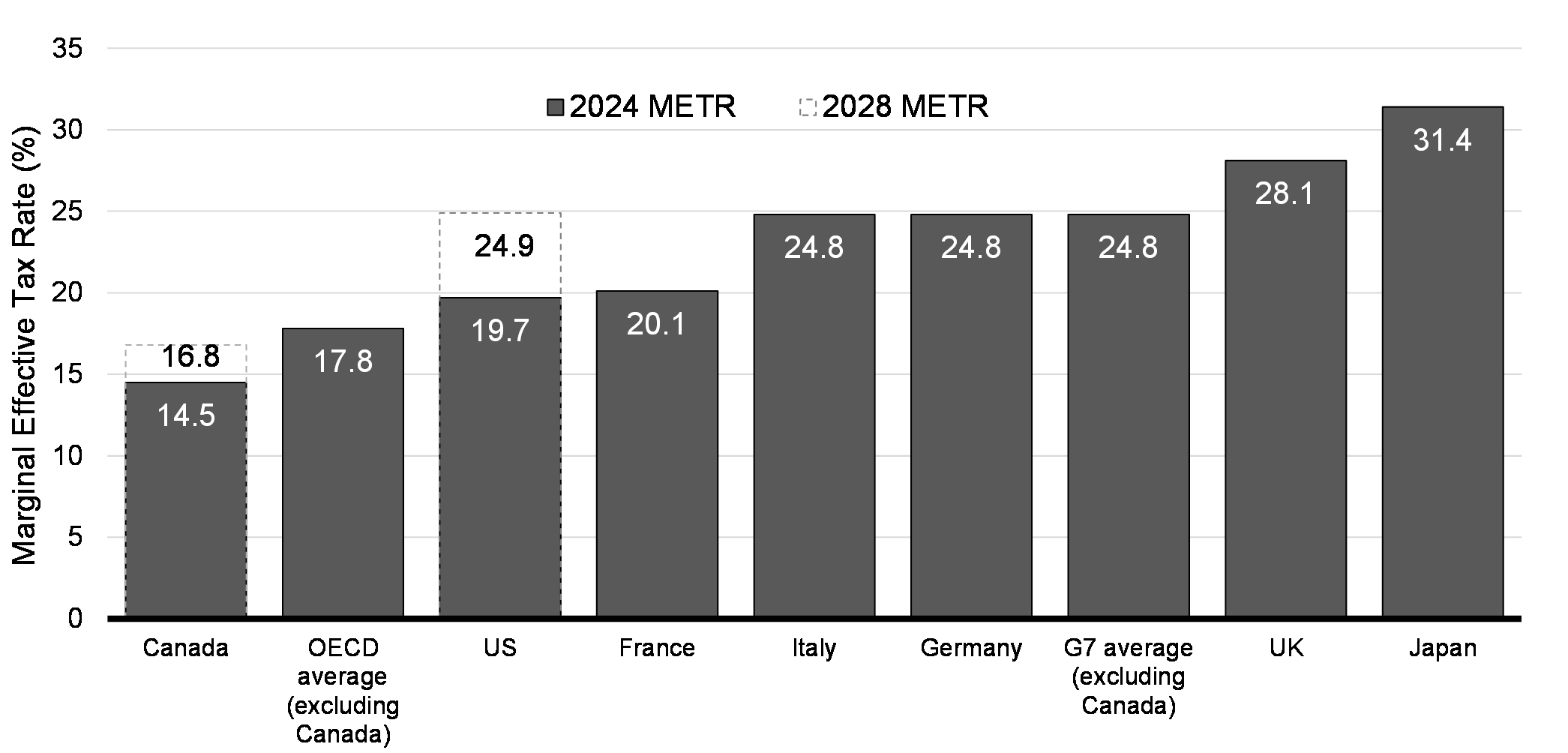
Page details
Calendar for Year 2025 (Russia)
- Disable moonphases.

- Red –Federal Holidays.
- Gray –Typical Non-working Days.
- Black–Other Days.
- Local holidays are not listed.

- The year 2025 is a common year , with 365 days in total.
- Calendar type: Gregorian calendar
- Years with Same Calendar as 2025
Customization Forms
- Customize this calendar–large – advanced form with more choices
- Customize this calendar – classic, basic form
- Change your settings for timeanddate.com – customize your country and time zone
Need some help?
Printable Calendars
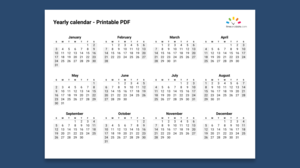
Yearly Calendar (PDF)
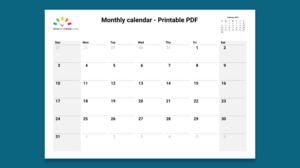
Monthly Calendar (PDF)
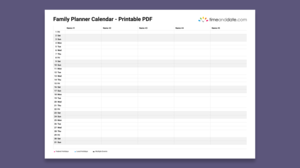
Family Planner Calendar (PDF)
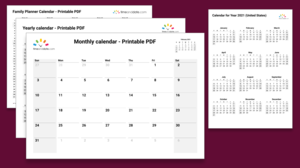
Create Your Own PDF Calendar
Calendar & holiday news.
- Latest news about calendars, holidays, and special dates
Other Calendars
- Calendar Generator – Create a calendar for any year
- Monthly Calendar – Shows only 1 month at a time
- Custom Calendar – Make advanced customized calendars
- Printable Calendar – PDF calendars for printing
Date Calculators
- Duration Between Two Dates – Calculates number of days
- Date Calculator – Add or subtract days, months, years
- Birthday Calculator – Find when you are 1 billion seconds old
- Week Number Calculator – Find the week number for any date
- Weekday Calculator – What day is this date?
Related Links
- Moon Phase Calendar – Calculate moon phases for any year
- Seasons Calculator – Solstices & Equinoxes
- Holiday API Services – Download or program with holidays
- Countdown to Any Date – Create your own countdown
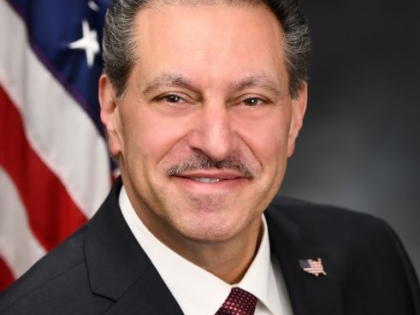
New York State Senator Joseph P. Addabbo Jr.
Chairman of Committee on Racing, Gaming and Wagering
( D ) 15th Senate District
Addabbo & Rajkumar to Host Free Paper Shredding & Household Goods Collection
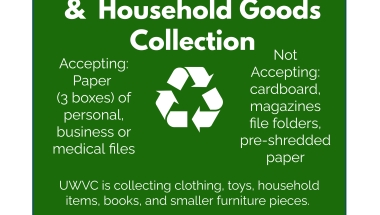
Forest Park Drive Woodhaven, NY 11421
- Apple iCalendar
- Google (online)
- Outlook.com (online)
- Yahoo (online)
To help their constituents clear out files and properly dispose of personal papers and donate useable household items to benefit veterans, Senator Joseph P. Addabbo, Jr. and Assemblywoman Jenifer Rajkumar are hosting a special event that combines those two elements. It is co-sponsored by Bethpage Federal Credit Union.
On Sunday, April 28, USA Shred will be at the Forest Park Bandshell Parking lot, located in Forest Park on Forest Park Drive in Woodhaven from 10 a.m. to 2 p.m. shredding paper and documents. The United Veterans War Council will be collecting donations for veterans including clothing, kids toys, shoes, household items, books and smaller furniture pieces.
“It is important to know that your documents, or your clients' documents, with sensitive personal information like social security numbers and account numbers have been properly shredded and recycled,” Addabbo said. “This is also a great opportunity to help our veterans. Clear out the clutter from your home and give your lightly worn clothes and used furniture to service members who could really benefit from it. I would like to thank my colleague Assemblywoman Jenifer Rajkumar for partnering with me on this event.”
Items that cannot be shredded during this event include any cardboard, newspapers, file folders, and metals or plastics. There will be a (3) copy box limit on how much can be shredded per person to ensure that all participants have the opportunity to shred their materials.
“I would like to thank our partners in USA Shred and the United War Veterans Council, the Parks Department, and GCOP for their continued participation in helping to keep the traffic moving during these popular events,” Addabbo added.
For more information about this event, call Addabbo’s office at 718-738-1111.
Share this Event
Press Release
Addabbo NYPD Pension Fund Legislation Passed As Part of the 2024-2025 Adopted State Budget
April 22, 2024
Addabbo Statement on Good Cause, ELFA No Vote
Addabbo bill to combat illegal dumping approved by nys senate.
April 18, 2024
Addabbo Hosts Interactive Distracted Driving Event in Acknowledging April As Distracted Driving Awareness Month
April 16, 2024
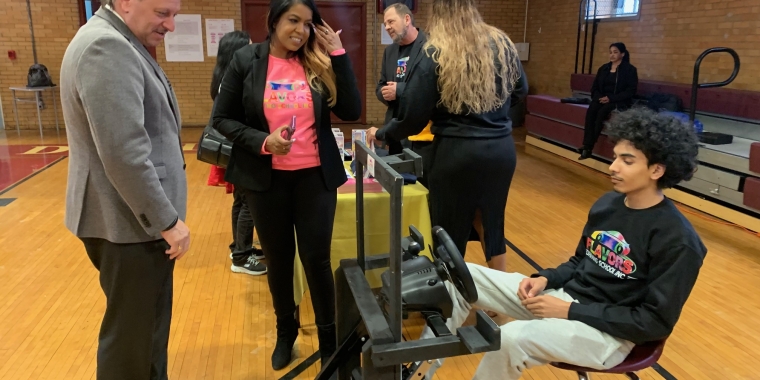
PATHWAYS TO FUNDING
Autism awareness month, coronavirus response and prevention, tick & lyme disease prevention, how a bill becomes law.
Senator has new policy idea
Idea is drafted into a Bill
Bill undergoes committee process
Senate and Assembly pass bill
Bill is signed by Governor
Media Center 4/19/2024 12:01:00 PM Greg Johnson
Technology rules approved in football
Automatic timeouts to occur in the last 2 minutes of the 2nd and 4th quarters.
Optional technology rules in football, effective for the 2024 season, were approved by the NCAA Playing Rules Oversight Panel on Thursday.
In games involving Football Bowl Subdivision teams, each school will have the option to use coach-to-player communications through the helmet to one player on the field. That player will be identified by having a green dot on the back midline of the player's helmet.
The communication from the coach to the player will be turned off with 15 seconds remaining on the play clock or when the ball is snapped, whichever comes first.
For all three divisions, teams have the option of using tablets to view in-game video only. The video can include the broadcast feed and camera angles from the coach's sideline and coach's end zone.
Teams can have up to 18 active tablets for use in the coaching booth, sideline and locker room. Tablets cannot be connected to other devices to project larger additional images and cannot include analytics, data or data access capability or other communication access. All team personnel will be allowed to view the tablets during the game.
The Football Rules Committee, which met the last week of February, had a thorough discussion regarding wearable technologies.
The committee invites non-FBS conferences that are interested in using wearable technologies to submit an experimental proposal to the committee. Any proposals must be made to the committee by June 15.
Two-minute timeout
The panel approved adding an automatic timeout when two minutes remain in the second and fourth quarters.
This rules change synchronizes all timing rules, such as 10-second runoffs and stopping the clock when a first down is gained in bounds, which coincides with the two-minute timeout.
First-down timing rules
After a year of review, Division III committee members decided to adopt the timing rules where the game clock would continue to run when a first down is gained in bounds. The game clock will stop when a first down is gained during the last two minutes of either half. Division I and II schools used this timing rule last season.
Other rules changes
- Allowing conferences the option of using a collaborative replay review system. This will be formally added to the rules book; it had been an experimental rule.
- Penalizing horse-collar tackles that occur within the tackle box as a 15-yard personal foul. Previously, a horse-collar tackle within the tackle box was not a foul.
Additionally, head coaches can conduct interviews with broadcast partners after the first and third quarters. This was allowed on an experimental basis last season and will be added as a permanent rule.
The panel did not support a uniform rule proposal made by the Football Rules Committee. Panel members were not comfortable with on-field officials having to enforce the recommended rule.
The panel understands the rules committee's concern but encourages the committee to look for an administrative solution that does not include game official enforcement.

Thanks for visiting !
The use of software that blocks ads hinders our ability to serve you the content you came here to enjoy.
We ask that you consider turning off your ad blocker so we can deliver you the best experience possible while you are here.
Thank you for your support!

IMAGES
VIDEO
COMMENTS
The initial announcement stated that these reforms to the Personal Statement system will be introduced in the 2024 admissions cycle for 2025 entry. However, UCAS have since gone back on this and delayed the change to as early as 2025 (for 2026 Entry).
The Future of Undergraduate Admissions report highlights UCAS' continued engagement and ongoing progress with admission reform, including: references. personal statements. grades on entry. personalisation. widening access and participation. Read the report here (3.38 MB)
Personal statements are set to become a thing of the past. The University and Colleges Admissions Service (UCAS) has introduced a new process for university applications from 2025, meaning that the process will change in 2024 ready for 2025 entrants. Personal statements have always been an essential part of the university application process.
We particularly welcome feedback on our approach to personal statements, as we continue to test and validate our proposed questions which we plan to introduce in 2024 for 2025 entry, and to ensure the new approach makes it easier for students to write their application and offers clarity to teachers, advisers, universities and colleges alike.
Personal Statement Questions 2025. Working with students and providers, UCAS have tested different models to make it easier for students to convey why they think they should be offered a place on a course at university. As a result, both groups identified a preference for. structured questions that make the task more clear and focused, and ...
But Ucas interim CEO Sander Kristel tells The Uni Guide the removal of the current personal statement requirement will now happen later. "We plan to introduce the structure adjustments no earlier than 2025 for 2026 entry, and only when we have assurances from those who support students that they are ready to adopt these changes," says Kristel.
In 2025, UCAS is shifting from the traditional personal statement to a more focused and structured set of questions. This change is designed to provide a clearer and more supportive framework for applicants, reducing stress and promoting fairness in the admissions process. The new format comprises three main questions, each with a distinct ...
Ucas have said the personal statement favours middle-class applicants. ... changes to the admission process will be introduced no earlier than 2024 for students applying to begin university in 2025.
Current findings from UCAS show that 79% of students found the personal statement "too difficult" to write without additional and appropriate support. That's almost 4/5 of applicants, so unquestionably shows the need for change. That doesn't mean, however, that students don't see and acknowledge the value of the personal statement.
The Ucas personal statement is to be replaced by a series of questions following concerns that it was too stressful for UK students. ... The questions are set to be introduced in 2024, for students entering higher education in 2025, while Ucas said it paved the way for further enhancements, such as moving to multimedia submissions.
Key dates for you. 30 April - Students can start searching for courses on ucas.com. 7 May - Adviser portal opens to set up for 2025 applications. 14 May - Students can start their applications in the UCAS Hub. View more 2025 key dates. The application fee for 2025 has been set by the UCAS Board and will be £28.50 for up to five choices.
Ucas intends to introduce the changes in 2024 for 2025 entry, after consulting with students, teachers, advisers, universities and colleges. ... "Breaking down the personal statement into specific questions feels to be a step towards a simplified, fairer application process," he said. "We will consider the proposals in detail and consult ...
2025 . ENTRY. JUNE JULY AUGUST SEPTEMBER OCTOBER NOVEMBER UCAS APPLICATION. q . Start working on it from . June 2024 - choose your course - choose a college or decide on an open application - write your personal statement - organise your academic reference q . Check if you need to take a test and what this involves. q . Submit from ...
Contact our Oxbridge-graduate consultants and book a Private Consultation for strategic guidance. Book a Private Consultation. As of 2024, UCAS is no longer going to require applicants to write a personal statement. Read how this is likely to affect you as an applicant.
Medical School Personal Statement Fundamentals. If you are getting ready to write your medical school personal statement for the 2024-2025 application year, you may already know that almost 60% of medical school applicants are not accepted every year. You have most likely also completed all of your medical school requirements and have scoured the internet for worthy medical school personal ...
Initially, UCAS had proposed changes to the personal statement system, indicating a shift towards shorter questions in place of the traditional long-form personal statement starting from the 2024 application cycle. ... in the process of consulting with students and educators to determine whether they will implement changes from autumn 2025 ...
The UCAS personal statement requirements are changing for university applications applying for 2026 entry. This means that changes will be implemented from October 2025 onwards, so current applications will not be affected by these changes. Students applying for degree programmes starting in the autumn of 2024 or 2025 will still need to write a ...
February 27, 2024. We are happy to announce that the Common App essay prompts will remain the same for 2024-2025. Our decision to keep these prompts unchanged is supported by past research showing that overall satisfaction with the prompts exceeded 95% across our constituent groups - students, counselors, advisors, teachers, and member colleges.
Keep your statement general as the same essay will be sent to all schools you will apply to. •5300 characters, including spaces AACOMAS (DO) •Your personal statement is a one-page essay that gives dental schools a clear picture of who you are and, most importantly, why you want to pursue a career in dentistry. •4500 characters, including ...
The personal statement is limited to 28,000 characters, which include letters, numbers, spaces, and punctuation marks. There is not a limit to how many personal statements applicants can create. Personal statements created outside the MyERAS application should be done in a plain text word processing application such as Notepad (for Windows ...
As a result, TSCL adjusted its 2025 COLA estimate for Social Security benefits to increase by 2.6%, up from its previous forecast of 1.75%. COLA is ultimately calculated based on inflation during ...
Bank statements are necessary for loan applications and IRS audits. Store hard copies in a locked filing cabinet or digital copies in an encrypted folder. Banks are required to keep statements for ...
It highlights where to start, key dates, and also gives an overview of the application and tracking process. Applying through UCAS 2025 (31.12 MB) - screenshots for you to copy and paste into your own materials and guides to share the application journey with your students. Hub Lives - videos to share with your students to connect them with ...
This is not right. Tax fairness is important for every generation, and it is particularly significant for younger Canadians. In 2021, only about 5 per cent of Canadians under 30 had any capital gains at all. Only 0.01 per cent of Canadians under 30 are expected to have capital gains above the $250,000 annual threshold in 2025.
From April 2025, travelers from Australia, Canada and the US will need a visa to visit Brazil. But to get it, applicants will need to show they have at least $2,000 in their bank account.
New York City Comptroller Brad Lander released the following statement on the FY 2025 New York State Executive Budget, including the housing deal: "At a time when New York is emerging from the pandemic era and aiming for a more robust recovery, we must do everything in our power to ensure New Yorkers can afford to raise their families for ...
Full Moon. 3rd Quarter. Disable moonphases. Some holidays and dates are color-coded: Red -Federal Holidays and Sundays. Gray -Typical Non-working Days. Black-Other Days. Local holidays are not listed. The year 2025 is a common year, with 365 days in total.
28 Apr 2024. Forest Park (Forest Park Bandshell Parking lot) Forest Park Drive. Woodhaven, NY 11421. 10:00 AM - 2:00 PM. Add to Calendar. To help their constituents clear out files and properly dispose of personal papers and donate useable household items to benefit veterans, Senator Joseph P. Addabbo, Jr. and Assemblywoman Jenifer Rajkumar are ...
Automatic timeouts to occur in the last 2 minutes of the 2nd and 4th quarters. Optional technology rules in football, effective for the 2024 season, were approved by the NCAA Playing Rules Oversight Panel on Thursday. In games involving Football Bowl Subdivision teams, each school will have the option to use coach-to-player communications ...
Chancellor King and the SUNY Board of Trustees Statement on the 2024/2025 Enacted NYS Budget. April 22, 2024. "The final 2024/2025 Enacted New York State budget underscores the commitment of Governor Kathy Hochul and the New York State Legislature to ensure New Yorkers continue to have access to high-quality, affordable higher education, as ...